#but you should at least justify a statement from multiple perspectives
Explore tagged Tumblr posts
Note
what's your opinion on homophobic actors ? for example the love by chance cast and their scandal with earth? there might be other homophobic ones idk about but I was just using that as a example I still want you're overall thoughts! would you still watch their stuff? or follow them? or another example actors admiting they used bl as a way for clout some people think thats okay and its justified would you agree?
BL Actor Homophobia
Oh boy. I don't really follow actor drama. Or I try not to. And I kinda don’t want do this, but I guess I should do a sort of official statement thingy. Since this fun silly side blog of mine has sort of gotten bloated and out of my control.
Like the giant peach.

ALT
In general, I think it's difficult to understand any celebrity's actual feelings on anything.
Sometimes it may not be safe for them to express their true opinion, because of image, brand, business, studio, agency, management, or family concerns or constraints. They may be more supportive or less supportive than we will ever know. Anything that approaches bullying is going to be even more complex because there are so many elements, perspectives, and entities involved. (Although I will always side with the victim.)
With regards to interview, vlog, or variety show missteps and misspeaks, a lot of BL actors are BABIES, like so young. Tell me you didn't make a stupid fucking idiot statement when you were in your late teens and early 20s. Well, you CAN tell me you didn't, but I won't believe you. I certainly did. I was a pretty lousy human for a while. Queer af but still lousy.
And a bunch of queers from other countries jumping in and attacking is surely going to change baby boy’s tiny mind... right? Yeah, no. No, it’s not. Multiple studies have shown that attacking someone only drives them into a corner and hardens their sentiments.
Honestly? I don't think it's ever a good idea to make a hero out of an actor... they are, after all, ACTORS. I mean, come on, you must have meet some of the breed?
Make a hero of the BL character he portrayed, certainly! But not the actor for goodness sake. He’s only an actor, after all.
Celebrity turns people... odd. Or maybe it's just that the type of personality that seeks celebrity is innately suspicious? At least to this curmudgeonly introvert. (The fact that I all too often end up dating the fuckers is my terrible judgement and wicked bad taste.)
Where was I?
In most of these cases netizens take everything out of context, or at the very least hugely exaggerate. People pick camps. Yes there are certainly bad apples, but I think about this with kpop a lot, sometimes it's all shades of grey and no celebrity is as evil, or as good, as we want them to be. They're mostly just gloriously shiny narcissistic pricks (affectionate).
Particularly with something like homophobia, the context of identity (or identity erasure or abuse) is very culture specific. With BL we are often talking about places where, until recently, they didn’t even have a word for gay. I don't like to get outraged in general, it's exhausting. But to get outraged about something that some pretty kid said or did, in a language I don't speak, born and raised in a culture I did not grow up in, to a family dynamic I cannot comprehend?
It seems like, considering all the grey areas, I am not really equip to judge.
It's not the same thing, but I'm a long time melody and I often think about what happened to Ilhoon. As an outsider what he went through seems absolutely insane. But I've never lived in South Korea. What the hell do I know? I can only make a judgement call from my safe little nest where (currently) weed is legal and has been for ages. I guess, at the very least being in Kpop should have taught Ilhoon how to be careful enough not to get caught?
And I guess that's were I do judge.
If the actor is homophobic (by any standards), and acts in BLs, at the very least he shouldn't have gotten his tiny hypocritical arse caught out, now should he? Tut tut on the brand management, fella. Practice a little circumspection.
Oof. My cynic is showing.
Look, I’m not that bad, I’m just an old tired queer. We’ve been fighting a long time. Can’t I pass the buck (or blunt or cock) along?
Mostly when one of these stories crosses my radar I just feel sad. And I don't wanna feel that way around BL (or Kpop for that matter), so I try not to even register it's happening.
Here, you wanna get outraged, get outraged about this:
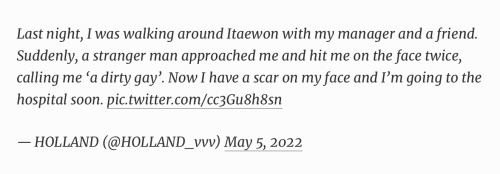
ALT
There are major cultural issues in play here, and when this kind of thing happens to an idol on the streets of Seoul, I’d venture to say, there’s society wide systemic problems at the root of of this kind of homophobia, that the homophobe’s are manifesting - like symptoms of a disease. Sure you can treat the pox (with a damp wet white towel, perhaps?), but darlings don’t you think it’s about time we developed a vaccine? (And maybe I think that’s kinda what BL and pop culture can do to culture, if it gets normalized enough.)
But currently, with these homophobic incidents? We all lose, and we are all to be pitied because of it.
I love BL because it leads with love, and that’s the best I can practice at this point in my life. Try to talk more about positive BL dramas and less about negative BL actor drama. Try to be a little more loving and a little less outraged.
That’s it, I don’t have a solution, sorry. Just... perseverance, I guess? su su na and all that.
(source)
60 notes
·
View notes
Note
i get the feeling that most of the people zote meets dislike his personality, but the fact that he is always there, complaining about whatever catches his attention, is reassuring. that's what he inspires in me, after all.
Yeah Zote is like. a lying braggart who likes the sound of his own voice and that’s trouble but it’s actually in the scope of things not nearly as much trouble as you’d expect; he’s basically too self-absorbed to do much damage except by accident and doesn’t even really... like from what we see, the only person who he even talked to for a second was Bretta and I doubt she was targeted by him, I feel like it’s more he just talks at whoever comes to listen and when he showed up lugging a warrior’s helmet Bretta found that exciting and came to look. Elderbug, Iselda, nor Sly ever particularly comment on Zote, hardly suggesting he made a detailed campaign blackening Ghost’s name to Dirtmouth and may not even realize he did that to Bretta. He’s just constantly spouting his own personal narrative because saying it out loud is the only way he knows how to make it count.
Like he’s actually kind of lonely and pathetic but I feel like he’s not so memetically and breathtakingly annoying that it’d drive anybody to a rage, especially in a world where the default for almost every person you know and meet is either dead and gone or struggling to survive. And Zote himself, as he so artlessly leaks in all directions, clearly has a hell of a history, however reliable his perceptions of that may be or not; he clearly at least somehow feels like nobody ever cared about him and has a grudge on his brother and hates both his parents. It just doesn’t condense into a “tragic backstory” that would evoke pathos because his motivations are ultimately both petty and selfish and he basically just wants to feel cool.
But I think there’s something important and kind of powerful about Zote? In a bleak empty world where death is a constant companion and every single person is either dead, dying, or struggling to live, it’s important to confront the realization that not every survivor is going to justify their existence to you. They aren’t going to be mechanically useful, or give you a reward, or tweak your emotional pathos inclinations.
Does this mean their survival should be revoked? Because IMO, killing Zote is one of the most fucked up things you can do in the game. It’s the only time that Ghost acts one to one like the Pale King- they repeat their trauma by looking, and seeing another person struggling at the edge of their vision, and simply walking away. And Zote’s broken mask lies behind, just like the masks at the abyss. And your only opportunity to do that has to be before you meet Zote, before you talk to him, before he has ever done anything to offend you. In a story that does not acknowledge the metagame of multiple save states (and the game saves after you take the actions that seal his fate either way, so you can’t use the repetition you are capable of ingame- the death-resets- to change your mind) it means that you cannot have any knowledge of Zote before you decide his death.
If you kill Zote, you have to kill Zote from a perspective of not knowing who he is and choosing not to find out. It’s not a statement on who Zote is. It’s a statement on the fundamental value of life.
That a character who is otherwise so comical has such a bleak, horrifying aspect to his story is, IMO, a really interesting flex, and it’s why I’ve never quite been able to get on the train of “it’s just a joke to talk about how horrible Zote is constantly every time he comes up” because vested in this guy is an actual interesting discussion of, “have I become the arbiter of life and death here? Do other people have to flatter me before they’re allowed to live? That’s... a little tyrannical, isn’t it? When did I get the right to decide who mattered enough to live?” and I think it fits that this is a very scary thought to even occur to Ghost considering they are themselves, explicitly and canonically, someone who was left to die not because of anything they were or quality they had but simply because they seemed less important than another person around them.
PK didn’t even hate them. They just didn’t matter to him, and the murder weapon is simply not making an effort when doing so would let more people go home, in a time with too much death.
#Hollow Knight#Zote#Anonymous#Zote is like a shopping cart test#do you extend basic tolerance for other people's right to live even when they're like dumb and rude and you don't like them#because lbr Zote is not a compelling or industrious enough liar to actually even create trouble for you
228 notes
·
View notes
Text
"Onision: In Real Life DEBUNKED” Breakdown & Thoughts
Confirmed by Sarah over a 9 hour phone conversation with Onision
I’ve seen a lot of people speculate this phone call never happened because James’ claim that it was 9 hours long. I can’t lie, that threw me off when I first read it too.
I believe most likely he is exaggerating the length of the conversation, although it’s not impossible for the them to speak for 9 hours.
The date he claims the call took place on lines up with the dates and times of Sarah’s last 2 tweets. She seemed very upset. I am not going to post them because her account is currently private.
the conversation started January 22, 2021 and ended around 1am her time, it continued laters that morning only to end with Sarah's sister taking the phone away and screaming that she was happy Sarah ruined his life while refusing to give the phone back to Sarah
So they took a break in-between calls. Possibly he is counting the 9 hours based on when their first phone call started and their last call ended.
Her sister taking the phone away and telling him off gives me the impression Sarah was extremely upset while talking to him. I don’t believe this was a confession / begging for forgiveness call like he is trying to make it out to be.
SARAH'S CONFESSIONS DURING COVERSATION 1-22-2021:
I doubt that these were confessions. Based on his past debates and interviews, I think it is more likely James walked her through carefully worded scenarios / events and forced her into answering with a simple yes or no. If she tried to add more or explain herself, he would cut her off and exclaim he was right. That’s how he’s treated others during debates, especially during recent interviews about Sarah’s (& others’) accusations against him, so that is how I imagine the call going down.
- The fraudulent #MeToo'ers were paid to participate in the documentary.
I understand the concept of it being unethical to pay accusers for interviews due to it possibly being an incentive for them to exaggerate, but everyone already participated in free public interviews. Everything they said in the documentary they have already stated multiple times for free. They did not say anything new. I personally don’t see them allegedly getting paid to be on the documentary as a blow to their credibility.
Also, James wanted to be paid to participate as well. So if he participated and was paid, should we no longer consider his claims valid? Especially since he would not just defend himself, but also make accusations against everyone since he claims he is actually their victims. Actually, I wouldn’t be surprised if he was already paid for at least one of his interviews about this whole thing by now.
- Sarah now has enough money to "Make a down payment on a house"
This is so incredibly vague. That could be almost any amount of money. Also, I don’t trust his quotations. He didn’t specify that was a direct quote from Sarah. He could have asked her how much she was paid and she would not say, so he asked if she could make a down payment on a house.
- Sarah again admitted to apologizing twice for raping Onision via sexual extortion.
So she agreed that she said “sorry for raping you guys” twice as she was angrily leaving the house? We already heard that story from him 100 times. He never went into detail about why she left angrily, but I always assumed it was because they got into a fight and that is when he first accused her of rape. I always assumed she said that sarcastically in response to his accusation.
- Sarah made it clear the documentary had her sign a contract of silence so she could not "legally" reveal how much the fraud #MeToo'ers were compensated to be involved.
I don’t think she would know how much other people were paid? I don’t believe she is in personal contact with Shiloh or Regina and I don’t think Discovery would disclose details of their contracts with other participants.
Since Sarah falls under “fraud #MeToo'ers” in James’ perspective, this makes me think she stopped him questioning how much she was paid. Now that I think about it that way, he may have been taking the “down payment on a house” quote out of context. She may have been giving him an update on her life. He did says she “now has enough money” to do so, but didn’t specify that was because of the documentary.
- Sarah stated she truly hates both Shiloh & Regina (the other fake #MeToo'ers)
We already know this. Sarah and the other victims publicly cut ties with Shiloh and Regina because they chose to stick with Chris Hansen and participate in the documentary. The other victims wanted to stand together and not participate to try to prevent the documentary from happening.
- Sarah admitted Regina & Shiloh are frauds.
If she did, he’s not specifying what was allegedly fraudulent. The way he says “admitted” makes me think he talked about a specific incident and asked her if she agreed it was fraudulent. Like, Shiloh’s tattoo fund or something.
If she admitted she believed Shiloh and Regina were lying about their accusations, he definitely would have said that and not this vague shit.
- Sarah admits she herself intentionally mislead people to make Onision look bad.
Lmao as if she needed to strategically mislead people in order to make him look bad because he was so gosh darn innocent in this whole situation. I definitely believe he lead her into agreeing that she was misleading about one thing that made him look bad and he is using that to justify this broad statement.
- Sarah again admits she was kicked out of Onision's life for comitting a crime against Onision.
He’s just repeating himself. This is the same point as the alleged rape apology.
- Sarah admits she blatantly went out of her way to silence Onision/prevent interviews from happening so he could not deliver facts/evidence.
We already knew about this. Chris Hansen said he decided to drop negotiating an interview with James because the victims asked him not to do it.
This did not “silence” him. He went on plenty of other interviews.
- Sarah admits the laptop she had and mislead people about, in fact had nothing on it.
I am imagining two possibilities:
1. It’s possible James was misleading with his question and asked if there was something specific that he already knew was not on there, like photos of himself or photos of minors.
2. Sarah also sent a cell phone to Chris Hansen and Vincent. Perhaps the internet got mixed up and hyper focused on the laptop when it was really the cell phone that contained the damning nudes Kai sent to Sarah as a minor.
- Sarah admits she only turned her laptop in because the internet pressured her to. Confirming she defrauded countless people to replace the laptop via GoFundMe, not revealing to them the laptop she turned in had nothing on it.
I don’t believe the internet pressured her into originally sending the laptop to Chris Hansen / Vincent. I believe she did it to help the investigation. When she found out it was never given to the FBI months later, she seemed extremely upset.
After she got it back, that is when she noticeably hesitated on what to do with the laptop. People on the internet definitely pressured her into doing something with it before she was ready. Her being pressured into handing in the laptop to the FBI does not prove there was nothing on it. She most likely hesitated because either she did not want to deal with it / needed a break or she did not know who to trust with it.
Sarah was not the one who made the GoFundMe, it was Shiloh. The description said she needed a new laptop while the FBI had it for an investigation. That was true.
I’ve seen the argument that Sarah asking for funds for a laptop was fraudulent because she was fine without one while Vincent had it. Looking back, Vincent told her he was going to remove the hard drive, send the hard drive to the FBI, give the laptop a new one, and send her laptop back. I know during this time she was borrowing a friend’s laptop. This makes sense to me. She was borrowing because she thought it would be temporary. Once she officially handed it over herself to the FBI, she no longer had access to one and needed one for school.
(Washington state law prevents phone conversations being recorded without both parties consenting, Sarah was very concerned the conversation was being recorded, repeatedly asking if she was being recorded - as usual, Onision told the truth, he recorded nothing)
I’ve seen a lot of people talk about ways he could have gotten around this law or legal ways he could have proven this conversation happened. At the very least, he could have taken a screen shot of his call logs to show the date and how long he was on the phone for.
I think it’s worth noting he has recorded people over the phone without their consent in the past. Like Shiloh’s manager and Madison.
I’m not saying he’s outright lying about the call, but I don’t understand why he expected the internet to believe some vague bullet points about a phone call no one knew about about until he randomly made a page on his site for it a whole month after the call took place.
Tl;dr - He’s being way too vague. I believe he is taking a lot of the conversation out of context and manipulatively lead her into answering yes or no questions that would make it look like she’s admitting to the thing he’s accused her of and denounced her past accusations against him.
13 notes
·
View notes
Text
25 Best Sports TV Shows
https://www.denofgeek.com/wp-content/uploads/2020/09/TV-High-School-Travel-Guides.png?resize=400%2C400
Sports stories have traditionally belonged to the movies. Something about the rhythms of competition, in which an athlete or team trains, plays, and then either wins or loses, is a natural fit for the film world’s three act structure.
Television, with its multiple episodes and seasons, is often more discursive and therefore less viable for truly great sports stories. Thankfully, that all seems poised to change. While some sports TV shows have found success in the past, now the medium has really kicked things up a notch. Sports stories like Brockmire, Ted Lasso, Cobra Kai, and more are not only welcome on television, but an essential part of the cable and streaming landscape.
Read more
TV
The United States of TV High Schools
By Alec Bojalad
Movies
The Best Sports Documentaries To Stream
By Scott Fontana and 2 others
With that in mind, it’s high time we pay homage to TV’s great sports programs. What follows is a list of 25 of the best sports TV shows of all time, hand selected by Den of Geek (i.e. me: the arms-crossed weirdo in the picture at the bottom of this article).
It’s important to keep in mind that these are the best scripted sports TV shows. Television is, of course, no stranger to live sports and the various programs that surround them. Consider these unscripted American sports shows as honorable mentions: Hard Knocks, Last Chance U, Ken Burns’ Baseball, The Last Dance (and most other 30-for-30s), Cheer, Inside the NBA.
Enough of the undercard, now onto the main event.
25. Red Oaks
Amazon Prime’s Red Oaks examines the bougie tennis lifestyle of the 1980s. It all comes through the lens of David Myers (Craig Roberts), a college student looking to pick up some cash by taking a summer job at an upscale Jewish country club in New Jersey. Sports stories and coming-of-age stories fit particularly well because the end goal of each one is usually growth. It’s hard to say whether David grows during his time at Red Oaks, but he certainly changes over the series’ three seasons.
24. The Mighty Ducks: Game Changers
A TV show based on Disney sports movie behemoth franchise The Mighty Ducks was all but an inevitability, particularly when the major conglomerate secured its own streamer in Disney+. We’re all lucky then that The Mighty Ducks: Game Changers turned out to be quite good rather than completely perfunctory. The show is bold enough to recast its Ducks’ franchise as the villains and to rally around the radical idea that youth sports should be fun.
23. One Tree Hill
At first glance, One Tree Hill doesn’t seem too different from the other teen shows of its era on The CW (though The CW was still “The WB” for One Tree Hill’s first two seasons). It’s about high schoolers in a small town, doing high school things. Where One Tree Hill excels (at least in its early, still high school seasons) is the introduction of basketball as a storytelling crutch. Half brothers Lucas (Chad Michael Murray) and Nathan Scott (James Lafferty) have a turbulent enough relationship to begin with. What better way to contextualize that relationship than through the high stakes lens of high school basketball?
22. Lights Out
Not to be confused with the 2016 horror film of the same name, Lights Out is a boxing series from FX that ran for one excellent season in 2011. Holt McCallany (best known now as Agent Bill Tench on Mindhunter) stars as retired heavyweight champion Patrick “Lights” Leary. Despite displaying signs of neurological trauma from his career, Lights can’t help but want to return to the ring for one more shot of glory (and to pay off his family’s many debts). Lights Out is a sad, elegiac little story about how one man who sees a sport that broke his brain as the only realistic option for success.
21. Big Shot
Big Shot premiered shortly after its bigger-named Disney+ cousin The Mighty Ducks: Game Changers. And while Game Changers made a slightly bigger splash, Big Shot might be the better sports show. The story follows Marvyn Korn (John Stamos), a tempermental basketball coach who ends up at an elite all-girls prep school to shepherd its basketball program. Big Shot runs through all the tried and true tropes and beats of sports stories and does so with aplomb. Consider it Hardball meets Hoosiers with plenty of Stamos charm.
20. Hangin’ with Mr. Cooper
Sports are somewhat incidental to Hangin’ with Mr. Cooper’s mission. Sure, lead character Mr. Cooper (Mark Curry) is a former Golden State Warriors basketball player turned PE teacher. But like its TGIF programming block peers, this show is a charming hangout comedy with few lasting conflicts to speak of. Still, you don’t spend that much time in a gym without some three-pointers and lay-ups.
19. Coach
Before Craig T. Nelson was Mr. Incredible (or made this truly amazing televised statement), he was best known for portraying the title role in ‘90s ABC sitcom Coach. In fact, many of our archetypical perceptions of what makes a football coach likely come from Nelson’s portrayal of Coach Hayden Fox (who first coached for a fictional NCAA football team and later an NFL one). This is a man whose skill at molding young athletes belies his lack of skill at…well, everything else. Ultimately, Coach is a worthwhile multiseason experience in which a grown man grows up.
18. Kingdom
Kingdom is probably the best sports TV show that you’ve never heard of. Don’t worry, it’s not your fault. That’s just the kind of thing that happens when a show is damned to languish on AT&T’s ludicrous “Audience Network”. Kingdom is set in an MMA gym and captures all the drama provided in the heightened world of mixed martial arts combat. The show is blessed with some great characters and an even better cast. Frank Grillo (Captain America’s most annoying foe, Brock Rumlow), Kiele Sanchez (Lost), Matt Lauria (Friday Night Lights), Jonathan Tucker, (Justified) and Nick Jonas (yes, that Nick Jonas) all make their mark on the series.
17. The White Shadow
Premiering in 1978, CBS’s The White Shadow was uncommonly progressive for its time. The series follows Ken Reeves (Ken Howard), a white NBA player who retires after a knee injury and elects to take up coaching at Carver High School in South Central Los Angeles. Coach Reeves’s team is made up primarily of Black and Hispanic players and the show deals with the social ills of life in the inner city. It’s also quite funny and charming and features a commitment to realistic basketball scenes.
16. The League
FX comedy The League works as a sports show (and as a TV show in general) because it has a deep understanding of sports from a fan’s perspective. Sure, fans watch collegiate and professional sports to marvel at the athleticism, training, and skill on display. But more importantly, they watch sports to have something to talk about with their friends. Though the participants in the titular fantasy football league at the center of The League grew up as friends, who’s to say they would have stayed friends so long without this league keeping them together? Ruxin (Nick Kroll) is an asshole. Andre (Paul Scheer) is annoying. And Taco (Jon Lajoie) is, well…Taco.
15. Rocket Power
If the ‘90s taught us anything it’s that extreme sports are sports too, man! Rocket Power is a lovely little slice of life Nick Toon that follows four kids in a fictional California surfing community. Otto Rocket, Reggie Rocket, Maurice “Twister” Rodriguez, and Sam “Squid” Dullard spend their days skateboarding, surfing, playing street hockey, and occasionally snowboarding. It’s a wonderful ode to childhood and all the athletic activities that make the day (and years) go by far too quickly.
14. Luck
If things shook out differently, perhaps Luck could have been considered one of the five or so best sports shows of all time. All of the pieces were in place. This 2012 HBO series had the right creative team (created and run by Deadwood’s David Milch and starring Dustin Hoffman with a pilot directed by Michael Mann) to go along with an intriguing premise (complicated characters’ lives intersecting at a horse track). But alas…the dead horses. Oh so many dead horses. Despite stringent safety measures put in place, Luck lost three hoof bois during filming of its first season and was canceled shortly thereafter. May they all rest in peace.
13. All American
High school is a turbulent time in all our lives. And when the high stakes world of competitive football is added in, things can only get more intense. The CW’s All American opts to take the world of high school football and opts to add in a welcome dose of sociopolitical commentary. This series is loosely based on the life of former New York Giants linebacker Spencer Paysinger and follows his character “Spencer James” as he is recruited from South L.A. to play for the affluent Beverly Hills High. The show wisely understands that sports (particularly when they involve Black teenagers) are a marvelous portal to explore American society.
12. Pitch
Cruelly cut short after just one season of 10 episodes, Pitch is the kind of sports show that will inspire sports stories for years to come. This baseball series for Fox comes from Dan Fogelman (This Is Us) and Rick Singer. It follows the saga of Ginny Baker (Kylie Bunbury), who becomes the first woman to play in Major League Baseball when she’s called up to pitch by the San Diego Padres. Pitch was blessed with an excellent cast including Bunbury and Mark-Paul Gosselaar as a veteran catcher nearing the end of his Hall of Fame career. More interestingly, it was blessed with an actual MLB licensing deal. There are no silly fictional teams in this show like the Tuscaloosa Barn-Burners or the Helena Hellcats. It’s all real MLB team names and logos, adding to the realism of a cool premise.
11. Ballers
Of course, Elizabeth Warren’s favorite show has to be on this list. Ballers has a bit of an unearned reputation for being cringe thanks to its ridiculous name and Dwayne “The Rock” Johnson’s delightful cornball energy. In reality, this is an exceedingly watchable TV show and one that examines the corporate side of professional sports quite well. It’s also noticeable for being most viewers’ introduction to eventual Tenet star John David Washington.
cnx.cmd.push(function() { cnx({ playerId: "106e33c0-3911-473c-b599-b1426db57530", }).render("0270c398a82f44f49c23c16122516796"); });
10. GLOW
Is professional wrestling a sport? Vince McMahon would argue that it’s “sports entertainment.” I would argue that that’s more than good enough to get the excellent GLOW on this list. GLOW tragically fell victim to Netflix’s whimsical cancellation procedures. Why the almighty algorithm decided a show needed to be canceled after it was already renewed is beyond me. But don’t let that sour three seasons of superb sportsy storytelling. GLOW follows the fictionalized rise of the very real “Gorgeous Ladies of Wrestling” and it centers it on the conflict between two former best friends, Ruther Wilder (Alison Brie) and Debbie Eagen (Betty Gilpin). GLOW differs a bit from the usual sports fare in that the “sport” at its center wasn’t necessarily plan A for the athletes. But the experience of watching the ladies train, grow, and succeed is pure and sublime sports story stuff.
9. Cobra Kai
Cobra Kai absolutely could have been phoned in. The streaming world runs on nostalgia and there’s nothing more sweetly nostalgic than The Karate Kid franchise. Instead, this Netflix series changes the original franchise’s perspective by focusing on the “villainous” Cobra Kai dojo and re-examines things from Johnny’s point of view. Ralph Macchio and William Zabka deserve credit for embodying realistically adult, yet flawed versions of their original characters. Equally deserving of credit though is a whole host of young actors bringing the martial arts to a whole new generation.
8. Blue Mountain State
A lot of the shows on this list are, let’s say, reverential to the sports, teams, and athletes they cover. Spike comedy Blue Mountain State is decidedly…not. This series, following the Mountain Goats football team for the fictional college Blue Mountain State, understands that not all depictions of athletes have to be saints. Sometimes college football player can just be the big dumb animals you want them to be. Through three seasons, this show developed a cult following that would follow it over for a lifetime of reruns on Netflix. Blue Mountain State is crass, dangerous, and entertaining, not entirely unlike football.
7. Sports Night
Speaking of being reverential to sports…like all Aaron Sorkin-created TV series, Sports Night can be a bit full of itself sometimes. That only works when the topic at hand, like the federal branch of the U.S. government, is consequential. Thankfully, sports can be pretty important sometimes too! This late ‘90s show follows the goings-on at a Sportscenter-esque news program hosted by Dan Rydell (Josh Charles) and Casey McCall (Peter Krause). It has all the witty dialogue you’d come to expect from a Sorkin venture. And if you can make your way through the inexplicable laugh track of the early episodes, you will find a mature, entertaining show that properly understands and contextualizes professional sports’ role in American society.
6. Survivor’s Remorse
Survivor’s Remorse came into the world with two strikes against it. One is a bizarrely overwrought name, and the other is that its home network, Starz, isn’t a given on many cable packages. Still, this LeBron James-produced comedy is shockingly one of the best sports TV shows ever (and perhaps still the best creative venture James has been involved in yet). This story follows NBA athlete Cam Calloway (Jessie T. Usher) as he tries to balance the business and basketball aspects of his life. At first the show focuses on Cam’s guilt for having got out of his impoverished neighborhood when so many couldn’t (hence, the show’s title), but ultimately it evolves into a family comedy drama featuring some truly remarkable characters and performances like Cam’s cousin and manager Reggie Vaughn (RonReaco Lee) and his baller half-sister “M-Chuck” (Erica Ash). Even Monica Rambeau herself, Teyonah Parris, is a part of the proceedings.
5. Playmakers
Sometimes I can’t even believe that Playmakers is real. Surely, this ESPN series about a fictional football team in a fictional league that is clearly the NFL was just a post-9/11 fever dream we all endured together. Alas, Playmakers was real and it was awesome. This series follows the players on the Cougars as they navigate a football landscape filled with ripped-from-the-headlines strife including Performance enhancing drugs, good old-fashioned drugs, domestic abuse, concussions, and more. The series even introduces the outing of a gay player more than a decade before Michael Sam and Carl Nassib revealed their sexual orientations. Naturally, Playmakers was canceled when the NFL intimated to its broadcast partner ESPN that it wasn’t too pleased with the content of its show. And enraging the National Football League alone is enough to make this an all-time classic.
4. Eastbound & Down
Eastbound & Down creator and star Danny McBride isn’t necessarily a huge fan of baseball. But he is, thankfully, a huge fan of weirdos and creeps. When McBride discovered just how bizarre and poorly behaved certain flamethrowing relief pitchers could be, Kenny Powers and the show around him was born. The baseball “action” in Eastbound isn’t much to write home about. The show isn’t too concerned with the results of any given baseball game and McBride always looks like he’s throwing a javelin and not a baseball. It’s still a phenomenal saga about athletes that dives into Paul Bunyan-esque tales of legendary misbehavior that fame encourages. It’s no coincidence that in the follow ups to Kenny Powers, McBride has delved into megalomaniacal vice principals and bejeweled, sweaty televangelists – all different aspects of the white American male id.
3. Ted Lasso
Of all the sports shows in the TV canon, none feels more like a traditional sports movie than Ted Lasso. This Apple TV+ series plucks an American football coach-fish and gently places him out of water in the English Premier League. The affable Lasso (Sudeikis) is charged with reversing the fortunes of EPL side AFC Richmond. Little does he know, however, that spiteful owner Rebecca Welton (Hannah Waddington) is counting on him to fail, Major League style. Ted Lasso isn’t interested in reinventing the wheel. Instead it perfects it. This is a tale of relentless optimism and unconditional positive regard. Ted breaks the mold for what we expect from coaches, which is probably why so many actual coaches are fond of the show. Simply put: sports stories can’t be done much better than this one.
2. Brockmire
Sometimes commentators like to bemoan the modern state of baseball. What was once American’s pastime has now supposedly fallen behind things like football and videogames in the pop cultural pecking order. Then along comes something like Brockmire to teach us that baseball as a continuous, seemingly eternal American presence is just as vital as ever. In a career-defining role, Hank Azaria plays disgraced baseball broadcaster Jim Brockmire. Once at the top of his game, an on-air drunken meltdown loses him his job and his sanity. In season 1 of this superb IFC show, Brockmire returns to the booth, this time for an independent league team in Morristown, Pennsylvania. The four seasons that follow are one big love letter to not only baseball, but the messy human experience itself. It’s rare that you get something this funny and this affecting. The fact that it’s wrapped in a stylish diamond-shaped bow is just icing on the cake.
1. Friday Night Lights
Not only is Friday Night Lights the best sports TV show of all time, it’s hard to imagine it ever being supplanted from its throne. Simply put, Friday Night Lights is a sports television masterpiece. Each of Friday Night Lights’ five seasons (save for the writer’s strike-shortened second) fully capture the ecstasy and agony of high school football in a small Texas town where high school football is the only thing that matters. Friday Night Lights doesn’t shy away from the unsavory institution that is big time high school athletics.
The series opens with a life-changing injury before following it up with tales of corrupt boosters and garden variety West Texas racism. And yet, the show never looks down on its characters. If winning state is important to Coach Taylor (Kyle Chandler), Matt Saracen (Zach Gilford), Tim Riggins (Taylor Kitsch), Smash Williams (Gaius Charles), and Vince Howard (Michael B. Jordan), then it’s important to us too. In fact, when Friday Night Lights is really rolling and the W.G. Snuffy Walden’s Explosions in the Sky-style soundtrack is swirling, you might not recall anything ever mattering to you as much as the Dillon Panthers or the East Dillon Lions winning a football game. Clear eyes, full hearts, absolutely cannot lose.
The post 25 Best Sports TV Shows appeared first on Den of Geek.
from Den of Geek https://ift.tt/3zuH9T4
2 notes
·
View notes
Text
Legion Rewatch Notes,
Chapter 5:
Everything You Wanna Be
Pre-amble: Farouk’s showing David how to use (and how he thinks he should be using) his powers. There’s a lot of self-absorbed moments from David, and as we know from future episodes Farouk desire is for David to have the same God complex he does. It’s likely he’s attempting to push him down that path all throughout the ep. It even culminates with him attacking Amy just like he did in s2. Only he doesn’t actually end up killing Amy here, though if I had to guess... he would’ve if the others weren’t on their way. Farouk sees killing Amy as “setting David free.” He’s trying to make David hate her (hence forcing Amy to reveal her secrets) so that he’ll start to see the world the way Farouk does. Hypocrites, liars, cheats. “The world will never respect us, therefore we deserve to be as selfish as we want.” Sound familiar? I think David’s actions are explained by Farouk trying to gradually instill these thoughts throughout the episode.
(Post ep addition, pretty sure I was right)
His actions here could be interpreted as more attempts to be helpful, just poorly approached. He tells Melanie he met her husband. His face looks smug, but he could also be smiling cause he thinks she’ll be happy about it. He does look confused when she walks away, as if he’s not sure what he said wrong. Alternatively, Farouk encouraged him to be callous, but after he said it his empathy kicked in and he wondered if maybe it was too mean.
David seems more at piece here than at any other point in the show, and this despite just getting Kerry shot by targeting the wrong person.
Syd seems very concerned about Kerry. The first thing she tells David is that they stopped the bleeding. David then cuts her off from going into what they discovered on their mission.
Small addition: what was Syd gonna tell David about the mission? What was she gonna say they may know now?
“I’m The Magic Man.” Very Shadow King of David to give himself a prestigious nickname.
Another moment of David trying to overcome Syds condition for his own desires. It’s still possible he thinks Syd wants this too. And if the latter’s the case, then it’s also another incident of David trying to be helpful and coming off as creepy unintentionally. From his perspective, he can finally give everyone what they want. What he thinks they want (And they’re all gonna owe him for it).
“It’s all an illusion. I see that now. Why’d I fight so hard?” “They’re signals, that’s all. Impulses sent from nerve endings. Electricity in the brain. Real, fake, it’s all the same.” ~Is that what one has to believe to properly understand the astral plane? Is there no way around solipsism for powerful psychics? Or is it just Farouk’s influence?
Syd is the first one to go in for the mouth to mouth kiss.
Cary seems to mistrust David a little bit this episode. Or at least be apprehensive about him. When Melanie says he could bring Oliver back he stays quiet and looks to Kerry. Melanie also looks to Kerry and seemingly understands his apprehension. Kerry getting shot happened specifically because David intervened. At least, that’s my interpretation of the subtle acting there.
Cary also told Melanie the episode before not to get her hopes up. That could also be what his look meant.
David’s stated multiple times he cares more about Amy than anything. Now he’s confident in his powers and Melanie’s STILL trying to keep him from going. That might be why the David side of this mind-meld goes along with the coming cruelty.
I think David’s definitely a little mad at Melanie for still telling him he can’t save his sister. I guess the connection is they both have someone they want saved, and if Melanie won’t let him save Amy, then he’s not exactly motivated to save Oliver.
Syd makes fun of Melanie's sadness about Oliver. “How long has he been in there? The astral- whatever 🤔🙄😴?” She was more empathetic when she wasn’t around David.
When Melanie says Oliver’s been lost for “21 years” Syd’s disposition changes. It looks like she maybe reconsiders her mean girls approach, a pang of guilt probably.
David seems to also be making fun of her a bit. I guess thinking about it, Lenny does always tell David not to trust them. The whole of Summerland I mean. Maybe David’s taking her advice on them since she did help get him out the astral plane. Or maybe Lenny’s just exerting more control in those moments.
Everyone in the room picked up on Davids hostile stance. I think... perhaps David’s reviling in the sense of power he feels right now. He no longer feels the need to listen to anyone but himself. With his powers, he can do whatever he wants. This is all by design, Farouk wants him to experience this specific feeling. It all go towards his goal of turning David into someone like him. A power broker with a God complex.
Despite Kerry being the protector in their relationship, Cary always end up taking on her wounds anyways.
The first “Who teaches us to be normal when we’re one of a kind.” Followed by “Promise me if you get lost, we get lost together.”
She says the latter fresh off of hearing Melanie's story about Oliver, who got lost and left Melanie alone. She also says it off the heels of discovering Davids past and his previous violent incidents. All throughout her journey last episode Ptonomy was trying to convince her that David was mentally unwell. Therefore “lost” in this since could mean both literally lost as in lost in the astral plane, and metaphorically lost as in losing your mind. And in combination with “who teaches us to be normal”, Syd’s essentially saying, “I’m no stranger to regretful past incidents. Just take me with you if the cookies start to crumble.” David would not end up taking her with him. Not that she wanted to go by that point anyways.
Additional note: This is the first recounting of Syd’s big mistake. Though, based on her tone, it seems like she knows what she did? Later in the series she’ll justify it more and twist it to place herself in more of a victim role. But here... the story is framed like an admittance.
David doesn’t want to leave without the others, Lenny convinces him otherwise.
It’s unclear when Lenny full takes over David. David’s had maniacal moments before that point, but not that bad. And the personality he shows in the D3 raid seems closer to his personality when talking to Amy in their old house later. That is to say... not his personality. He’s fully taken over by Farouk in the house, and scared out of his mind. Though... it’s still possible he just doesn’t want Amy to be hurt. Even before he and Farouk started merging, David was no stranger to remorseless killing. In ep 1 a D3 guy grabs him by the neck, the camera pans, a loud SNAP is heard, and suddenly David’s further down the path. No D3 guy in sight. And as pointed out in my notes for previous episodes, he does compulsively keep secrets even before s2. All-in-all, it being ambiguous is definitely the point.
David intentionally left earlier than he said he would. Summerland was clearly preparing for the raid, but Lenny convinced him to leave them behind. Everyone’s trying to help David, but Lenny keeps isolating him, and encouraging him to be cruel. And because of the situation with Amy, he’s more inclined to listen to Lenny than anyone at Summerland.
BIG NOTICE: Ptonomy says, “You don’t think I have a sister. Or a girlfriend. Or a mom?” Because of the next episode, we know he lost his mom when he was little. If he’s stretching the truth about her, maybe he’s stretching the truth about the girlfriend and the sister. He might just be frustrated with all the trouble around David and is putting forth any and all arguments to try and get the others to see reason, whether or not it’s relevant to his actual life. Like Devils advocate.
Ptonomy gets real harsh this scene. “This war is bigger than some guy named David and his sister” is probably relevant for future episodes. But making fun of Melanie's Oliver grief? It’s starting to feel like everyone’s doing it at this point. And she’s very offended by it.
Syd very sweetly says, “He found a way for us to be together. A place.” It meant a lot to her. Remembering the white room puts Syd in a certain mood, as discussed below.
Syd’s been acting like this all episode, or post-white room at least. She’s “love drunk.” “All animals need physical contact to feel love.” While that’s not exactly accurate, Syd’s first experience with non-power-activating touch is very impactful. But even despite this she’s not completely impenetrable. After the couch scene earlier, the affects started to wear off. She seemed worried looking at David as he flanked Melanie like a predator. And she pulled back on her cruelty after hearing how long Oliver had been lost. But this scene is after she’s had another hit. And similarly to the couch scene, she pulls back after hearing Melanie’s concern. This pattern will continue in later seasons of the show.
ALSO ALSO, as noted in the previous episode, David’s life falling apart pre-clockworks was in part because of bad influence from his friend “Benny.” And now in the present he’s making tons of dangerous decisions again because of the bad influence of his friend “Lenny.” In both cases Davids actions will be considered his own, regardless of who influenced him. I’ll just leave it at that.
Syd can’t think of a retort to Melanie’s statement. David’s acting completely differently than the David she knew before. She doesn’t know what to think of him right now.
Everyone’s been doubting David’s capability all episode, but now for the first time they see the absolute power he wields. And it’s horrifying. It wasn’t just doable for David, it was easy. It was too easy. It’s starting to become clear why Ptonomy asked David, “What are you?”
Everyone they meet in D3 is a potential enemy, even prisoners like Kissinger. This mindset makes them seem very unheroic.
The first attack we see David do in the security footage is that bright light pulse attack. It doesn’t turn them to shadows, but it definitely instakills them.
If Farouk wasn’t fully in control... why would he show up on the infrared? He normally hides himself inside David’s head, no?
Cary hears scary Farouk generated noises even when David’s not physically around. It seems like Farouk’s hauntings naturally infect people, like a virus.
I think Cary may have left the room when Farouk started fully messing with David. That’s probably why he hadn’t seen this footage before.
David leveled their entire forces in ways never before seen, all to get Amy back. “This war is bigger than some guy named David and his sister.” Evidently not. David is the most powerful being on Earth. And because of that, he’s the most important too. Or at least... that’s what the show repeatedly implies.
David is once again implied to be inhuman (not the actual marvel classification, just... un-human). In this case we could attribute it to them seeing The Devil With Yellow Eyes come towards them on infrared. But it will still be reapplied to David later on.
Through the discovery of Farouk, David’s previous actions are all forgiven. This mutant parasite has been the one rewriting his memories and influencing his actions for as long as David’s been alive. Ptonomy has a look of understanding, as do Melanie, Syd, and Rudy. It all clicks now, every little action. So now all they have to do is get Farouk out of his head, and everything will be hunky dory. I’m trying to say, the goal is clear for the first time.
A very disturbing scene. David’s lost control completely, and all his nightmares are guarding the exits to his mind. The situation may be clear, but that doesn’t mean this will be easy, or harbor no long lasting affects.
Amy fully admits she knew and was too scared to say anything. Knowing that Farouk later kills her for Davids sake makes this all the more dreadful.
When “David” says “You know something about me,” Amy shakes her head at first.
Farouk scares Amy into spilling the truth. “My whole life is a lie. I just need to know... who am I?” After Amy says it, “You were adopted,” Farouk allows the real David to come forward again. He wants him to feel this for himself. The feeling of betrayal, never being told his real origins. An outsider in every way imaginable. His ideas about himself all have different context now. His fondest memories throughout the series were with his parents and sister as a little kid. And now he’s not biologically related to them. He understands what Farouk meant now. His “whole life is a lie.” Amy knew this and kept it from him for decades. His adoptive parents never told him. Everyone’s in on it except him.
Syd is thinking of the white room on her way to see David.
“I don’t have an illness!” Farouk is succeeding in his goal of making David rethink his relationship with Amy. Perhaps in the moment... he no longer feels much compassion for his sister. She didn’t just hide the adoption after all, she also contributed to the societal gaslighting around his powers. I’m starting to see why she’s portrayed the way she is in the next episode...
“He’s not crazy, this is much, much worse.” What once were thought of as delusions are now being validated as completely real. David is no doubt traumatized, but he doesn’t have paranoid schizophrenia (according to the show at the moment). What he does have is a mutant-ghost that needs busting.
With David’s relationship with Amy permanently changed, Farouk moves on to messing with his Summerland friends. The goal, again, is to isolate David and convince him of his philosophy. “We are Gods. Gods make rules, they don’t follow them.”
Syd sheds a tear out of fear after being jump-scared by The Angriest Boy. She’s scared as all get out, but keeps moving forward for David’s sake. Syd is once again willing to risk everything for David. Or... is she just risking it for the idea of him? What’s the difference?
Walters abilities are still unclear to me.
Cary almost played charades with Melanie to tell her about the crown (or halo in this iteration?)
Kerry can either summon or just store weapons inside of Cary.
David’s very upset that he can’t stop Lenny. And he still thinks Lenny is a part of himself. We know better. But it does seem clear hear that David didn’t want any of the things that happened that day to happen. I think I feel comfortable clearing him on all charges for the D3 raid. For now...
David’s the one that first puts him and Syd in the astral plane. Farouk just seizes the opportunity takes control of the simulation. No doubt to multiple ends.
3 notes
·
View notes
Text
All right, rant time, and the theme... is themes. (The other theme is Mirai Nikki. We’ll get there.) Quick disclaimer that I’m far from having any sort of expert opinion on literature, so there are likely people who will disagree with me or say things in a much more precise manner. That aside, here we go.
One of the core elements in whether or not I find a piece of fiction satisfying is whether or not it can maintain a consistent theme throughout. Thematic elements exist across a wide range of moods, goals, genres, and so on, and generally reflect on the driving philosophy of the narrative work. They are the parameters that create the framework in which a fictional world exists, much like the laws of physics in reality. When characters and plot move along with respect to the laws that govern them, it provides a cohesive experience. This doesn’t necessarily mean the story is good, but it is coherent. If characters and plot actively subvert the themes of their setting, then it creates a jarring or dissonant experience in the viewer (I’m looking at you, Gurren Lagann).
Sometimes this can be used to great effect. A “twist” ending or sudden change often relies on a thematic shift to move the story from one paradigm to another, with the jarring nature of that transition intended to create emotion of some sort in the viewer. However, to do so effectively requires for the secondary theme to be present throughout the first theme, but simply hidden or not acknowledged. Whether a second theme that enables the twist was properly set up is often seen in whether an audience feels like the twist “came out of nowhere.” Well-executed thematic shifts reward their more perceptive and invested viewers.
The other important part of themes is that they provide a vector along which the story and characters develop. This doesn’t mean that all characters and story beats evolve in the same way, nor should they, but the theme of the work provides the boundaries for the trajectories each element takes. We ultimately want the end state of the characters we like to be somewhere along the thematic route from where they started. Whether the net movement is positive or negative doesn’t necessarily matter as long as we felt that the character’s path had meaning. This is the predominant reason that most people find the endings of shounen manga disappointing, since often the trajectory of the characters’ stories get narrowed down into some sort of textbook feel-good ending that doesn’t reflect any complexity of the plot that came before.
Now then, for the core of the rant. The reason that I hate Mirai Nikki’s ending is that it completely breaks with the thematic elements of the series in order to provide not even a feel-good ending but a self-serving ending on the part of the author. The core element of Yukiteru’s character from the beginning is that he is a passive observer of the world around him. He is highly perceptive and precise in his observations, but it is entirely outwardly facing without regard for himself. This is stressed multiple times throughout the series, as is Yukiteru’s passivity in the face of ongoing events. It is only when he is thrown into a life-or-death situation where his own survival is paramount that this self-neglect becomes a critical flaw, which is then supplemented by Yuno’s character of being entirely centered on Yukiteru. In a messed-up way, their views of the world are necessarily complementary for both of them to survive. This is a good thematic hook to start off on, and intersects with the other diary holders and the ways they each in turn view the world around them.
Mirai Nikki also deals strongly with the ideas of justice and personal codes of honor. The moral perceptions of the contributing characters and the way that each action is justified against those morals is as important to the themes of the story as their preferred method for recording the events of the world. These morals are often intentionally skewed in the sense that it takes an outside morality, often in the form of characters uninvolved in the battle royale like Nishijima or Yukiteru’s friends, to provide a baseline against which the dynamic personalities involved are measured. So far, so good. Throughout the series this served as a decent dynamic and reference point for just how far afield the characters go.
A two-fold problem arises with the way these thematic elements, and we’ll work backwards through them. First, the baseline that the series relied upon for grounding its moral code is broken in response to the event where Yuno kidnaps Yukiteru and holds him hostage. Eventually Yukiteru is saved and released, only to turn around and decide to stay with Yuno anyway because she loves him and the only way he can “save” her is to stick with her. This alone isn’t a breach of Yukiteru’s passive nature despite being frustrating to the viewer, but the problem is the more meta context in which it is portrayed. The characters serving as the moral basis for the series rightfully are disturbed by Yukiteru’s decision, but contextually they are depicted as being wrong for attempting to convince him otherwise. This initial point of fracturing in the theme of the story carries forward in the sense that the series reorients around Yukiteru’s actions becoming deterministic. He simply does what he has to do without regard for exactly where on the moral spectrum that falls. That could have been handled effectively if the moral backbone was maintained. However, it is cast into doubt by the author’s decision to portray a bad decision (with respect to the story so far) as unilaterally good rather than simply reasonable within the context of the story.
This draws a direct line to the second big fracturing point of the thematic elements of the story, which is the ending. Even after the aforementioned breach in the moral core of the story, there is some attempt to regain it by coming back to Yukiteru’s friends and bringing in Akise as an off-kilter moral foil for Yukteru and Yuno’s actions in the last arc or so. This never quite lands aside from having a plot device by which to force Yukiteru’s “character development” at the very end, but more on that in a moment. The core issues it that by the time the series ends, both Yukiteru and Yuno are “bad” characters not just from a reader perspective but from the baseline morality that pervaded the first half of the series. Yukiteru sacrificed his personal morals and Yuno was revealed to have almost none for the sake of winning the war, and the only reason they are still the protagonists by the end is that Yukiteru at least is still “better” than the other bad guys. However, due to the themes of justice pervading the series there is at least some need for consequence for all of the “bad” characters. Except... this doesn’t happen. Yukiteru ends up winning the war and Yuno dies, at which point the thematic conclusion would be that Yukiteru must suffer some consequence of note or at the very least come to a realization that his behavior should change to atone for the actions he took even if they were out of necessity. Instead, he mopes around until Yuno from the next universe was brought to him and they live happily ever after.
This also creates a problem in that it breaks Yukiteru’s character arc and catapults him back to how he was at the beginning of the series. Yukiteru starts from a passive observer to a more active element, but all of this continues to be outward-facing. He behaves within the story as a response to the stimulus around him, but most personal senses of motivation or responsibility are only cursory at best. Only in the final arc, in order to escape being Reality Marble’d and stop Yuno, does he realize his own responsibility for the state of the world around him and acknowledges that he must be the one to take action out of his own motivation. He gains resolve to do not just what must be done in response to the current state, but the “right” thing. Until... he doesn’t. He certainly does the first step in resolving things by winning the war, but then it stops there. Any personal sense of responsibility is immediately torpedoed because he lost his love interest despite being realizing that it was necessary to correct things. Only when she comes back does he regain motivation. This becomes a direct contradiction to the development that Yukiteru took into becoming an active character. He devolves immediately into his dependence on Yuno for motivation.
You could compare this to NGE, which seems to be what the author wanted anyway since they both have a depressed protagonist who “grows up” in the course of messy relationships with girls and authority figures set against a background of apocalypse. They both even have the silver-haired homoerotic male friend with divine knowledge who shows up late in the series as a character motivator for the protagonist. Anyway, whether or not you like Shinji Ikari as a character (I do not), his story follows a linear progression toward the end. He starts as someone with little sense of purpose or belonging and dependency on the affirmation of others, but ends up with the ultimate position of “I want to live in this world.” That final state is a powerful statement of just how far the character has come. Mirai Nikki doesn’t have this. Instead it moves past the character’s resolution and completion of the thematic progression in favor of doubling on the codependency that necessitated the early character state. The protagonist’s development was taken back so that he could still need the yandere girlfriend and they could be together in the end.
So what would have been the proper conclusion to Yukiteru’s thematic progression? It would be the role of an active observer. Throughout the story he becomes privy to the trauma of his friends (especially Yuno) and the many evils of the world that led people to act horribly. Then he was given the power of god by winning the battle royale. The natural progression then would be that he recedes into the background as before but now with the knowledge and influence to fix the problems that burdened the world around him. Instead of shutting down and shutting out things, he would return to his original position of being unseen and only seeing others, yet now with the maturity and capabilities to do something in that role. This carries his resolution from the final arc forward into the epilogue with satisfying consistency. Maybe then after he does all that you could justify bringing Yuno back, but honestly it would be better if she wasn’t even aware of what he does behind the scenes at that point.
That’s a long-winded way to fully articulate why I felt that Mirai Nikki just completely fell flat in the end. This wasn’t even failure to execute, but it was an active deconstruction of what the story seemed to be trying to achieve. All in favor of maintaining the OTP or whatever.
6 notes
·
View notes
Note
What are your thoughts about how Dean's being treated in the narrative this season? I was excited starting out but so far, I've just been disappointed by how he just seems superfluous to the plot. And I don't understand why the writers seem to be taking shots at him in almost every episode. The Achilles' heel thing, putting responsibility for the rift on his shoulders (while Cas' part is handwaved away), Garth's snub in naming his children, his undisputed claim that Sam is better than him (1)
at everything, Fortuna’s insult…it’s just a lot. Maybe it wouldn’t be so jarring if Dean wasn’t the only character being consistently treated like that. To be fair, it hasn’t been all bad. I’ve liked some of his character development (although I find his new tendency to not voice his dissenting opinion a little worrisome, given his natural intuition) and there have been some awesome scenes like standing up to Chuck. But I just don’t know…(2)
Thank you for this ask! I think it’s an interesting thing to explore. I have been feeling a little iffy about some things this season, too, so I want to use this opportunity to sort through my own thoughts. It’s gonna get long so I’ll put a read more…
Let’s start from the easy part. 15x11: I don’t think that Fortuna was genuine when she made that comment about Dean, and we’re not supposed to take the beach read comment as a reliable perspective. All she does is a sort of test to read them; she lets both Dean and Sam win a match against her at first, as a sort of test but also as a trick to make her opponent confident and make him play again. Except that Dean’s second match is against a very talented player, and he wins not because he’s lucky, but because he’s genuinely skilled. He proves that his skills at pool - a shorthand for his skills in general, which they had been doubting of, wondering whether it was all Chuck - are real.
Could skills beat luck? Probably not when luck is the goddess of luck herself, but I wonder whether Fortuna picked Sam as her opponent when stakes got high instead of Dean because she wanted to play against the less skilled of the two. I think that she’s playing them on and also off the pool table, and Dean realizes this when she goes “this one could be interesting”, you can tell from his reaction that he’s like “hey that’s a trick to play with the less skilled one of us” but Sam takes the bait. She also pretends to fall for Sam’s trick of distracting her by making her talk, just to reveal she can win whenever she wants to when the stakes are final. From what we’ve seen of her, I think we can infer that her modus operandi is to make people confident, so they’ll play again, higher the stakes, and then lose, not necessarily against her, just against someone, and lose their luck - she plays first with Dean when she doesn’t know who he is, and I assume it’s a common trick - let the newcomer win to stroke his confidence. (In gambling, the idea is to give players smalls wins to make them gamble more, and lose more.)
So, the narrative doesn’t give us any reason to believe that Dean isn’t right when he says that he is better than Sam at pool, and the point of the “beach read” comment is that he is not a beach read. Fortuna is supposed to be an unreliable narrator at that point, because she’s testing them. In fact, at the end, she rewards them on the ground of being “heroes”, which invalidates her previous statement, be it genuine or not.
Also consider that “sexy but skimmable” i.e. a pretty idiot, is the sort of taunt that Dean has received often in his life. If Fortuna is truly skilled at reading people, then she picks exactly something that has a history for Dean, and also something that has a history for Sam, i.e. that he’s more “interesting” (smart, skilled, whatever) than his brother. Coincidence?
That he’s pretty but otherwise worthless is something Dean has internalized by being told, not necessarily in words, over and over in his life. That reminded me of John’s old hunter friend who was like “didn’t you grow up pretty” and “if your father could see you now”. It took Dean a long time (and with plenty of fallbacks) to realize he’s more than a pretty face who follows orders. On the other hand, that he’s a more interesting “read” to Dean’s “beach read” is something Sam’s always had in his mind (he was the one who questioned the orders while Dean acted as John’s faithful little dog…) and it took him a long time, and some big blows to his own ego, to get out of that mindset.
So I don’t think it’s random that Fortuna goes for, you know, down with Dean and up with Sam, so to speak.
Dean’s statement that Sam is better than him at everything except pool - I read that as a very parental thing. It’s a very parent thing: telling your child that they’re proud of them for surpassing you. It should be the goal of a parent, you know, that your child is a better person than you - and a parent being like, you’ve become more skilled than me at my skills (except this one non-fundamental thing I can still kick your ass at :p) and I am proud of you, is a common trope.
So I read that as a small but very strong Dean-as-Sam’s-parent moment. Recently Sam also mentioned out loud that Dean raised him, so the writing team has not dropped this very important piece of characterization.
15x10. I think that the point is that Garth is Dean’s friend first and foremost. He doesn’t name his kids after his friends plural, he names his kids after the most important people for his friend singular. That’s how I read it at least. It’s weird because Dean hears one twin is named after Sam and assumes the two siblings are named after the two siblings, and the dissonance between his expectation and reality is what makes the humor. Also… Garth and Dean are a “who knows maybe in another life” kind of duo, you know…? They have a chemistry. Garth is Dean’s type, once you go past the appearances, and judging from Garth’s choice in wife, Dean’s pretty much his type too. You don’t name a child after that kind of person in your life.
Also, from a extra-diegetic perspective, Dean’s mirror is Gertie (from the name Gertrude meaning “strong spear/spear of strength”), the girl, because he’s always aligned with the feminine.
15x09. Now, this is the episode I’ve struggled the most with. Not sure if the problem is the episode itself, or the fact that the episode came after a season of the fandom acting a certain way towards Dean and Cas and their conflict, and that colored the episode a certain tint for me.
I’m kind of suspending judgement as I wait to see how the rest of the season goes and how Dean and Cas’ relationship develops, but my fear is that the narrative never really allows Dean to have emotions, so to speak, nor addresses Cas’ side of the issue(s). 15x09 itself is telling of a certain problem - Dean is experiencing certain emotions and going through a certain thing with Cas, but bam something happens that makes him terrified that he’s lost Cas again, and that forces him to scrap what he was going through. I’m not sure I’m explaining myself well here but bear with me.
He doesn’t get to sort through his emotions, he just goes in emergency mode again and the emergency just gives a yank to his emotions. I suppose the intent was “situation makes Dean realize he doesn’t want to lose Cas/he was wrong at making Cas the emotional scapegoat of his anger” but I don’t think it really worked. Dean was grieving and experiencing one of the most severe traumatic things in his life (actually, multiple at the same time). There’s no “right” or “wrong” in his emotions. I’m not saying that grief/trauma gives you a free card to be mean to others but… I mean, it does?? I think we’ve sort of created a culture of yelling “that’s abusive!!” at what are normal human experiences and expect that a person should act “properly” at all times. There’s a refrain of “x experience explains the behavior of y but doesn’t justify it!” which, sure, is valid with certain kinds of behavior, but there’s a whole jumble of normal human experiences in between “good” behavior and unjustifiable behavior.
Maybe I’m just culturally Catholic to the core, but all this pressure on Dean to beg for forgiveness for being harsh to Cas feels… iffy to me.
I guess I see forgiveness a bit differently, too, because I don’t think forgiveness - and especially when and how quickly you get there - is a choice. If Dean wasn’t emotionally ready to forgive Cas and open up emotionally to him again, then making him feel guilty for not being quick enough to get there is not exactly my idea of a healthy process.
Then there’s the “you didn’t stop me”, which, I get the whole thing behind it - Cas’ deepest fear is that Dean doesn’t care if he leaves, Dean’s deepest fear is that Cas is better off if he leaves, so, draaaama~~. But Dean has a history of people leaving him and feeling he can’t (isn’t worth) ask them to stay instead. Sure, it’s good drama. But I’m not sure that the narrative is allowing the space for understanding that Dean needs the emotional security of feeling like he’s worth to ask to stay just like Cas needs the emotional security of feeling like he has a place where he belongs and isn’t just a guest.
Again, I think it would be unfair to draw judgement of a narrative that is ongoing, and I hope that my fears are unfounded and the narrative will address what I wish it addresses! Of course with a little less than half a season still to go, emotional conflicts and character development can’t be wrapped up yet.
Another point you bring up is Dean’s reluctance to express his dissenting opinion. I do not think we have a pattern yet - his acceptance of Sam’s decision not to trap Chuck was intended, I guess, as a moment of growth in the sense that he acknowledged that Sam is a grown adult capable of drawing his judgement and make informed decisions, so he trusts Sam’s judgement and doesn’t drill him with questions. We still have to see how they all react to Jack’s revelation about Billie’s plan, so I would say to wait and see about that. Dean’s face at the end is not a “well this is excellent news” face, nor is Sam’s (who is framed after Jack talks about getting stronger, which is something Sam has a history with). Considering this season brought Lilith back, I’m sure they haven’t forgotten about Sam’s demon blood arc... I do wonder if Dean will avoid getting too confrontational with Cas, though. We’ll see.
Now, you say that he seems “superfluous to the plot”. I would normally say, well of course he’s superfluous to the plot, he’s the protagonist, he’s the one that reacts to the plot that happens around him. But I understand this is not the kind of answer you’re looking for. Honestly, I might be wrong, but I think that the first roughly-half of the season is the Male Part. The second part of the season should be the Female Part. In the first part, Chuck is rampant, Billie’s plan is dormant, Amara is minding her business and not being relevant to the plot, the plot is Sam-heavy, Rowena dies and reverts to playing a game of power, Mary is dead, Eileen is a piece played by Chuck. Now, with Billie’s plan being put in motion (although I don’t believe that’s the endgame or a Good Thing™ in unquestioning terms, but it’s still Death entering the game), I think a new phase should start. Dean confronting Chuck was already a start, and also how they got some support from a female deity that expressed negative opinions about Chuck -- I think that we’ve entered the second part of the season, and things are going to change. I’m looking forward to see what will be Amara’s role in all of this... especially considering that’s inextricably related to Dean’s role.
Feel free to ask for any clarification or addition or argument!!
#anon#my spn thoughts#spn meta#spn 15x09#spn 15x10#spn 15x11#dean#dean and sam#dean and cas#dean and garth#spn
51 notes
·
View notes
Text
RWBY Recaps: “Spark”
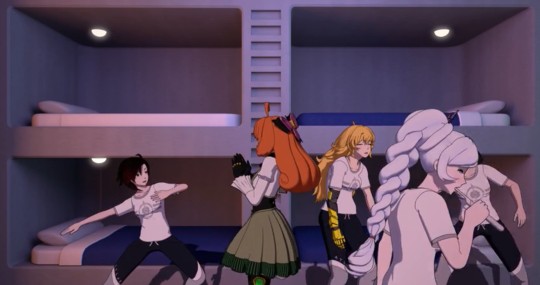
What’s the current mood? I would sell all future RWBY seasons for one episode of The Mandalorian.
Okay, I exaggerate. Overall this episode had some really great moments, just (per usual) tied up in a lot of awful implications. Which frankly is a step up from last week’s more overt nonsense, so I’ll take it. I’ve just got Space Dad Fever like the rest of the internet so whenever RWBY does something stupid my brain goes, “Why can’t you be more like Baby Yoda? With non-forced cuteness and consistent writing?”

Okay, okay I’m focused on the correct fandom. I swear.
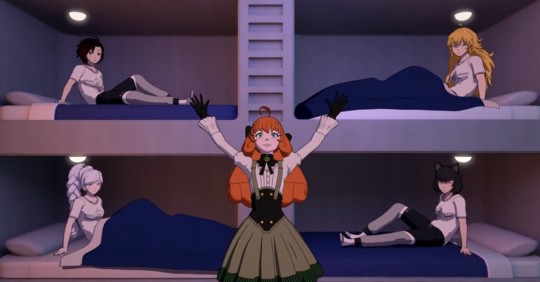
This episode opens with Penny waking the group up extra early. Yang wants to know what time it is. “Time to be huntresses, of course!” Really, the contrast between, ‘I love my job’ and ‘But my job makes me get up at an ungodly hour’ is easily the most relatable thing RWBY has done this season. I was also just greatly amused by the animation choices with in-world implications. Like that Weiss sleeps with her giant braid in. Or that the group owns nothing except for the new clothes on their backs. I wondered after the Volume Six’s train scene if most of their luggage had been up front with JNR, or if they’d lost it all during the crash itself. We only see three bags as they make their way to the farm.

Did Oscar re-pack everything before they had to hightail it out of that burning, grimm-infested place? I don’t remember and I’m way too lazy to go check. Yang then loses her motorcycle. Who knows, if they did have stuff, whether it got onto the stolen airship. Doubtful. I mean, Weiss showed up with a massive amount of luggage, but that’s for hiding grandmas. Basically, what I’m saying is that I think the group showed up in Atlas, exhausted, and had to tell Penny they don’t have PJs anymore. Cue standard issue t-shirts and strange thermal-ish pants.
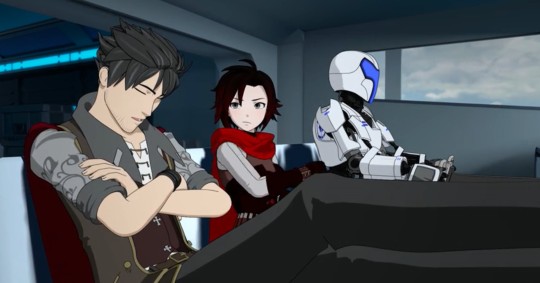
We then begin a montage of their different work. It starts out not with the missions they signed up for last episode but anything and everything connected to Amity Arena. Keep clearing out the mines. Protect resource transports. Fill in for the missing soldiers in Mantle, etc. On the whole I legitimately loved these moments showing the various relationships and life as a huntress in Atlas, with the exception of two scenes. The first is during the section where we see Blake and Yang working with Marrow, who makes the mistake of saying a) that they should consider partnering with other people sometime and b) pointing out that he’s not sure their styles are complimentary.
Look, I get it. A few hours after the episode dropped and tumblr is already exploding with GIF-sets of this scene, celebrating how Blake and Yang are so in love they can’t even stand Marrow suggesting that they might spend some time apart. From a shipping perspective it looks like gold and as someone who also ships them I’d normally be inclined to celebrate too. Except that this is a really unhealthy pattern of behavior. Marrow is right. The group should practice partnering with other people for the simple reason that this is a job and they may not always get to decide who they’re going to work with. It’s a job with endless risks and they may not always be able to control who they end up fighting beside, because when was the last time a plan actually worked right? The advice of ‘Hey. Don’t stagnant by only fighting with the same person 24/7’ is sound, especially in an episode already focused on training and progress. As is the innocent observation that their styles don’t seem to compliment each other. Marrow isn’t being cruel here. He’s not trying to insist he knows better and separate them based on that. He’s just making casual conversation---and gets this in response.


This scene would read completely differently if Blake and Yang were playfully smug after that attack combo. Then it becomes a moment of bonding where they’re correcting Marrow through a bit of teasing. Instead they’re legitimately mad. Mad enough that Yang’s semblance briefly activates. I’ve mentioned before that Yang has a tendency to think the worst of people and act violently towards them on instinct (Ozpin, bot in the street) and that Blake has a tendency to go wherever she leads, even when that makes no sense for her own characterization (siding with Yang’s anger over her own experiences as an abuse survivor). This is another example of that. Marrow gives them good advice and makes a casual comment? Immediate fury from Yang. Yang’s pissed off? Well I’m gonna be pissed off too. I try not to bring shipping too much into these recaps, but I do think it’s worth mentioning here. Big Blake/Yang fans have a tendency to paint everything they do as the most Romantic Thing Ever ™; anti-Blake/Yang fans have a tendency to make blanket statements about how their relationship is inherently unhealthy. But as usual the truth lies somewhere in between. They’re fantastic together, I think Rooster Teeth is setting up a relationship, and there are also aspects that are unhealthy. Not because it’s queer (which is the basis for most antis’ anger), but because the writing has them enabling their flaws in the name of “support.” Sorry, but if you can’t deal with someone making a comment as innocent as Marrow’s without beating up a grimm in fury about it... then you either need to work out that relationship insecurity or work on general anger management. Because Marrow didn’t deserve those cold looks and these two weren’t justified in receiving his panicked backpedaling. It’s one of those little things that presumably means nothing on its own, but combined with Blake and Yang’s entire development speaks volumes. Let them talk through Adam. Let someone call Yang out on her judgments. It’s ‘fine’ in situations like this; not fine in situations like Volumes 5-6.
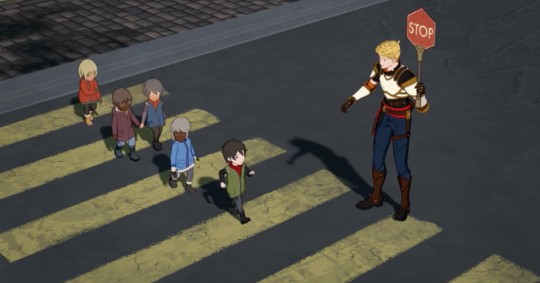
The other part of the montage that didn’t sit well was another ‘joke.’ Just like I’m not inclined to view Yang and Blake’s anger as cutesy romance stuff here, I’m not comfortable brushing off Jaune’s interaction with the kids’ moms as a bit of humor. Yeah, maybe I’m “sensitive,” but was no one else creeped out by that? Jaune might technically be an adult, but he’s, what? Nineteen? So a junior in college. Maybe a sophomore. A young adult is what I’m saying. Is it possible all these women are also eighteen to early twenties (it’s so hard to tell ages with RWBY) and they just had their kids early? Sure. It is possible that these women all decided to become single moms, or divorced their partners, or are open to polyamory? Also sure. But let’s be real here, that’s not the joke. The joke is that a group of older, presumably married women are thirsting over the young, hot huntsmen. People would be more willing to admit that it’s not a great humor choice if RWBY had done that to one of the girls, but when a guy is the target it’s seen as a funny victory. Look at Jaune getting all that older, adulterous attention! As Nora herself says, “It’s totally the haircut.” (Even though that haircut remains atrocious, sorry.) The message is basically that if a guy is hot enough it doesn’t matter that he’s just trying to do his job, that he’s probably far younger than you, that you’re probably married... go gawk at him and give him gifts that clearly make him uncomfortable.

Again, I realize I’m being “sensitive.” It’s just a web series, just a stupid scene meant to generate a laugh, etc. But I’ve reached a point in my life where I simply don’t find that sort of stuff humorous. As a woman who has had much older men hit on me while I’m trying to do my job, I look at the same thing happening to Jaune and ask, “Why was this supposed to be funny again?”
But anyway, enough about all that. Other moments in the montage include Ruby and Yang fighting grimm together (presumably in their downtime. Nerds), Winter pretending to be unimpressed with Weiss’ summoning, and Ironwood telling Oscar that maybe they can “jog [Ozpin] loose” with a bit of training.

Yeah, remember how excited we all were that, based on the Volume’s opening, we would at least see Oscar training with Ironwood? Remember how we all thought that this would provide him with some much needed character development? That maybe this would be the moment when he struggled with and potentially decided to come clean about their lies? Or he tries to talk to Ozpin while sparing with an incredibly difficult opponent? You know, since Ironwood himself brought up jogging Ozpin loose, we might actually get some interaction with Ozpin?
Boy were we optimistic! What we actually get is them charging each other for one hit before we cut back to others training. Namely Jaune. And this right here is the problem with this entire episode: for however cute and wonderful these moments might seem, they’re all flat out ignoring the primary conflicts of the show. The ones the writing keeps refusing to grapple with. Who knows how much time this montage is supposed to cover, but it’s substantial. We get multiple flashes of different days, see the group working on different missions, a couple different moments taking place in the early morning, so I’d wager at least another week has passed. Combine that with however long it took Pietro to make their weapons and you’ve got the group fully entrenched in their lies. No one is questioning Ruby. Ruby isn’t making headway towards trusting Ironwood. Everyone is just kicking their heels, happy with the status quo until something forces them to finally make a decision. They now, officially, have no right to judge Ozpin for the time he took to trust people. We see them doing the exact same thing here and they’re all happy about it. With the exception of those two quick flashbacks in “Ace Operatives,” we’ve seen no evidence that the rest of the group is struggling with their own hypocrisy. I---like many---had hoped that Oscar’s training session would finally acknowledge and expand on the rest of the team’s initial hesitation. But no.
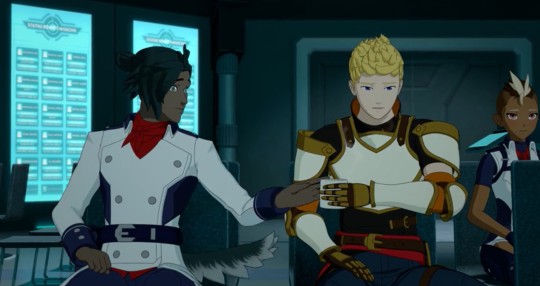
(In which Jaune’s expression is me.)
Jumping ahead just a bit, we see this same issue when Ruby, Penny, Qrow, and Ironwood are out driving the supplies. Ruby and Penny finally have some time to themselves! Will they discuss her murder and resurrection? Nope. Ruby vaguely references it with, “You know...” but there’s no actual depth to their conversation (and if you can’t even say ‘When you died’ that implies that maybe there are some lingering feelings about all this). Instead Ruby is interested in whether Penny has made new friends and she says that Ironwood claims she has no time for friends. Slot that in next to the Ace Ops’ ridiculous, “We’re not friends.”
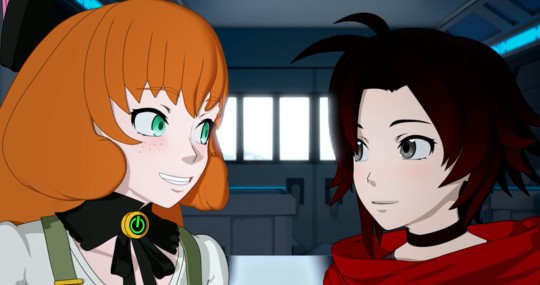
Second, we have this moment between Qrow and Clover where they reiterate the huge gap between age and experience here. Clover is hoping that “another generation” will do right by Remnant after we’re gone. Namely Ruby and the others. Continuing with that age theme, he reassures Qrow that “those kids wouldn’t be where they are without you” which is all well and good, but is anyone going to tell THEM that? The adults don’t need to know that they’re doing good work---even if it is nice for Qrow to get some validation for once---rather, the whole “we don’t need adults” fiasco came about because the teens refused to acknowledge that work. We don’t need someone telling Qrow that he’s helped keep them safe. Overlooking some insecurities (which RWBY isn’t tackling anyway), he knows that. We as the audience don’t need to hear it because we saw it all happen on screen. Rather, Clover should be put into a position where he reminds Ruby of all that her uncle has done for her. Just like Qrow talking to Ruby about her motivations for moving forward against Salem doesn’t accomplish anything, Clover telling Qrow, as one adult to another, that they’re worth something doesn’t accomplish anything either. These parties know all this already.
As a side note, this is why you should mix things up. Not just so that Blake and Yang can practice fighting beside other people, but so that people who don’t already agree can be challenged for once. Put Yang with Qrow and have him comment on her anger, continuing Tai’s work. Put Ruby with Clover and let him talk to her about what adults have done to get her here. All these moments of potential development are lost by maintaining the expectation that the original partners have to be the priority. Rooster Teeth had an easy way of throwing new people together by assigning them various missions and they didn’t take it. Yang is still with Blake. Ren is still with Nora. Of course Qrow is with the one other guy his age who we have to pair him with. Reinforcing these relationships is great, but so is pausing them too.
And then there’s the drinking.
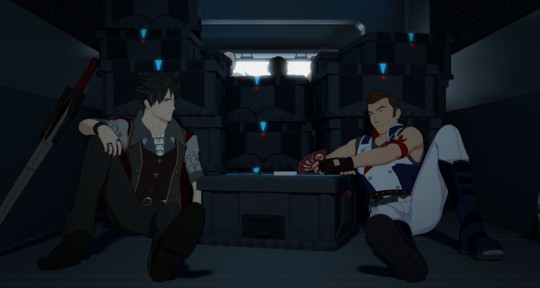
Hold up one second. I need to grab a bit of writing from my Volume 6 finale recap. Think back to Qrow and Ruby’s interaction in the airship:
And then Qrow lowers his bottle which… what? Alcoholism doesn’t work like that. Much more importantly, no one has tackled his drinking this season. Or the reasons he was drinking in the first place. Literally, Qrow’s semblance, his place in the war, Ozpin’s secret, none of it has been addressed. He has no reason to suddenly put aside his flask like he’s actually learned something. Does RT think we’re going to just imagine scenes that never actually happened?
After I posted this a couple of people pointed out that it doesn’t necessarily mean anything. We’ve seen other times where Qrow goes to take a drink and then thinks better of it, so it’s a reach to assume he’s magically given up drinking now. Which, fair. Now though it looks like that’s precisely what we got. Sometime between being found passed out on the front steps of the Argus house and reaching Atlas, Qrow just decided he was done with drinking and thus far we’ve seen no evidence that he’s struggling with that. Meaning, it’s not a conflict he’s working through. That doesn’t seem to be his arc this volume.
Yet he’s an alcoholic. Qrow’s drinking may have functioned as a joke for most of Volumes 1-3, but Volume 6 made it abundantly clear that this problem is incapacitating for him, especially after learning about Ozpin and Salem. So what happened? What changed? Even if I choose to overlook Qrow just deciding not to engage with his addiction anymore without help or backslides that we know of (doesn’t work like that...), I can’t ignore the fact that there was no catalyst for this. If the show wanted us to work under the assumption that Qrow stopped drinking because it endangered his family then they should have had him stop after the farm. You know, when he was almost killed by Apathy and had to be dragged out by his nieces. As it is, his drinking continues on throughout their whole time at Argus. He’s not picking up his scroll. He’s passed out on the steps. He’s brushing past Ruby to go get a drink instead of helping them figure out a way past Cordovin. Then a day later they make it to Atlas. So what precisely in that 24 hour period happened to change one of Qrow’s defining characteristics? Or, if this is supposed to be an arc wherein Qrow attempts to get sober and struggles with it, why haven’t we seen that? Again, they’ve been in Atlas for weeks now. This isn’t a one day sober Qrow with a naively optimistic outlook. He’s apparently been managing this for a while now with no downsides, no difficulties, no regrets.
Blake and Yang getting mad at Marrow instead of acknowledging their trauma. Oscar taking one hit at Ironwood instead of grappling with their secrets. Ruby talking about new friends instead of the relationship she already has with Penny. Clover telling Qrow adults are important instead of anyone telling the teens that. Qrow revealing that he’s just not drinking anymore. For reasons. It’s amazing just how much space this episode provides for the characters to start working through their conflicts and we bypass every opportunity. This is RWBY’s primary problem. Beyond the pro-protagonist perspective is the issue that, especially since Volume 5, the show has made a habit of introducing intriguing problems and then either twisting them so they have simplistic ‘solutions’ (we don’t need to tackle Ruby’s hypocrisy. She’s just “different” from Ozpin) or ignores them completely. We don’t need a new friendship vs. professional relationship conflict. We don’t need a new luck vs. bad luck semblance conflict. Not yet anyway. Not until we work through the conflicts that have already been introduced. Let Ruby talk to Penny about their own relationship. Let Clover help Qrow get sober. RWBY is like me when I’m writing fic. Why would I finish the thing I started when there’s this shiny new idea over here? Except I’m engaging in a low-key hobby whereas they’re writing for their livelihood. For the love of everything, please solve the problems we already have before chucking in new ones. You can give us all the same moments and relationships, just tailor them so they acknowledge the things the viewers have been waiting for you to tackle. I don’t need to know why Ruby and her team are Super Special because they’re BFFs when everyone else in Atlas apparently rejects friendship like the plague. I do need to know why a guy who was introduced downing a glass of whiskey apparently got over his alcoholism off screen.
Ugh. You know what we need? Penguins. Everyone look at the penguins for at least five seconds and allow them to cleanse your soul.

Heading backwards, before the transport scene we get a training fight between JNR + Oscar and Neon’s group. I honestly wonder how a team like theirs feels about them getting their licenses. After all, they fought at the Battle of Beacon too. The only reason why RWBYJNR got into extra, life-threatening situations is because they stupidly went off on their own. I realize that duh, as a story we can’t just have our protagonists twiddling their thumbs, but from an in-world perspective Ruby snuck out of the house to hunt down a woman who would absolutely have killed her and 100% would have been kidnapped if Qrow hadn’t followed to keep her safe. Everything else stems out of that. So not exactly a classically heroic basis for special treatment. All of which Neon and Flynt presumably don’t even know about because it touches on all those secrets. I suppose they just heard something along the lines of, “I, Ironwood, am giving two Beacon teams early licenses because they survived a horrendous battle. You, my actual students, don’t get them even though you did the same work.” It could have been really interesting to have some tension over this and for the group to see another complication of their secret keeping. Here they have to keep Cinder, the Maidens, the Relic, etc. quiet... but because of that it leads to some pretty awful miscommunication between friends. There are repercussions to your secrets and not all of them are things you can plan for or fix.
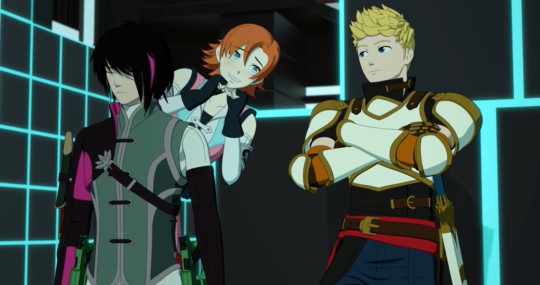
We don’t have anything like that though. Obviously. Instead we just get a generic fight with a side of weird Nora/Ren stuff. Meaning, Neon calls him Nora’s boyfriend and asks, “Where’s that energy when he’s around you?” Later Nora asks if they’ll still get sandwiches before work and Ren heaves out an annoyed sigh.
That moment struck me simply because it doesn’t come across like one of his normal, happily indulgent sighs. Ren seemed legitimately annoyed. Which is even stranger when we consider that Nora isn’t being over the top here. Sure, she pops up behind him in a sort of silly manner, but really all she’s doing is expressing that she’s hungry after an intense battle. Can we please make sure we grab something before heading off to work? That’s a more than reasonable request.
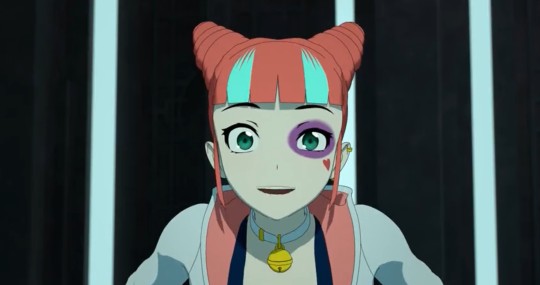
Ren shutting her down over his hair. Seeming to ignore her when she fiddles with it while on patrol. Neon’s comment about his lack of energy around her. Nora getting mad enough about it to give her a black eye (RWBY so rarely shows injuries). Ren seemingly put out by her theatrics. They’re all little things that only seem to paint a picture when put together, but of what exactly? It’s like I said last time, if the show wants to introduce some sort of arc for Nora and Ren this volume it had better do it soon. Really soon. Details that may or may not be setup can only take you so far.

During this battle Ironwood smiles down at all their progress, which could be endearing or creepy, depending on whether you think he’s hiding something (more on that in a bit). Neon actually acknowledges Oscar’s existence and draws a blush out of him, so thank you for that, Neon.
I thought for just a moment that Jaune might compliment Oscar too, but he just compliments the other team instead. At least they’re letting him train with him. After last week’s episode I’ll take this small step forward.

Back past the talk between Qrow and Clover, we finally get to meet the infamous Robyn Hill. She blocks the road to Amity Arena with one of her Happy Huntresses, the same faunus who was spying on the project last episode. And who I forgot to mention in my recap. Whoops. I love Hill already though precisely because she’s able to do what our protagonists couldn’t last Volume: stand down when a plan fails.

Hill takes her shot by putting up the roadblock and asking Clover to be straight with her, but when that doesn’t work and it looks like they’re about to come to blows, she admits defeat and lets them through. That’s how you handle a tenuous ally. Keep the peace and regroup with a different idea. Show them basic respect so that they might help you in the future. Clover’s “good luck” regarding the election speaks volumes about how everyone does want to help each other, they just need to figure out a way to do it. Hill could have attacked the group and stood her ground purely because she believes she’s right---just as Ruby did with Cordovin---but she demonstrates her maturity instead. She didn’t risk lives for the sake of getting what she wanted right here, right now. Despite the fact that what she wants likewise involves the safety of the people. Take note, Ruby.
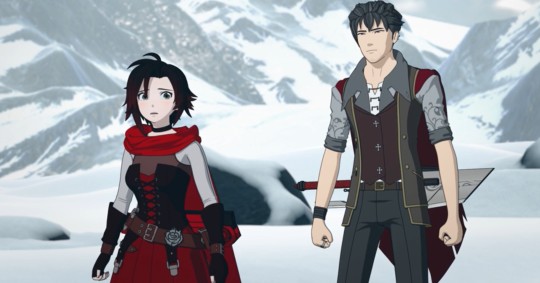
Speaking of, everyone catch that guilty look when Ruby learns that Ironwood’s project is taking resources directly from the city that most needs it? Yeah, what did you think was going to happen? At the very least the group saw that they were taking manpower away. Ironwood needs them to help protect Mantle because most of his men are off in the middle of nowhere, so the group is well aware that their actions are causing a negative impact. I highly doubt that the eight of them (including Qrow) can make up for however many people Ironwood is pulling out, to say nothing of the fact that many of them (like Ruby here) are also on Amity duty. They’re allowing Ironwood to put people, money, supplies, and time towards an endeavor that they know is bound to fail. Sure, it would be nice to have communication across Remnant without fear of losing that to the grimm again, but we all know Ironwood is primarily doing this because of the Salem situation. If he knew about her immortality he’d probably go, “Hmm. Well, the first part of the idea is still nice, but I probably shouldn’t pour this much into just a regular communications tower. Defeating Salem potentially justifies me hurting the people to get this done. But not anything else.” I’ll say it again: Ozpin’s secrets didn’t endanger anyone. Everyone from Pyrrha to Yang agreed to put their lives on the line for reasons entirely separate from Salem. Their lives were in danger from the start and, given their choices, always would be in danger. Ruby is the one whose secret is not just threatening all of Remnant in the future, but actively hurting people now too. She has the ability to stop this and she chooses not to.
Or rather, she chooses to keep putting off the decision. We’ll tell Ironwood when we’re ready. Yeah right. I still want someone to challenge Ruby on what this magical ‘He’s trustworthy!’ moment looks like. They’ve spent weeks with this man, fighting for him, training with him, accepting gifts in the form of weaponry, armor, facilities... so what exactly is it going to take, Ruby? I’m not saying Ironwood is trustworthy, I’m saying you can never know until the day they betray you. If that day comes. So when is Ruby going to acknowledge that? That she will never get that magical moment and that she’s just like Ozpin, putting off telling someone because the information weighs so heavily and there’s just too much to risk?

Hill thematically acknowledges the last two Volumes with, “It doesn’t have to be difficult. Just tell me,” while we all know it’s not that simple. Even if people would like it to be. Clover refuses, Penny spots two invisible huntresses closing in (nice), and as said, Robyn backs down.
We then end this episode with a long bonding session between Winter and Weiss. We see them fighting with their summonings and Winter comments about how, “You’ve grown up a bit, haven’t you?” We get it. You’re not subtle. Weiss has grown up. “Make no mistake. School is over.” They’re adults now! If only we saw that more than we heard it. Weiss at least is a character who has had legitimate, excellent development over the last couple of volumes. I’m admittedly a bit confused though regarding how that development aligns with the old Weiss. Meaning, we learned early on that she wanted to become a huntress to redeem the Schnee name. Now Winter is talking about how separating herself from the Schnees was the best thing to happen to her and Weiss seems to agree. So is that it now? Is Weiss just concerned with being her own person, or is she still invested in being a Schnee? Just a Schnee who embodies what her family used to stand for? It’s unclear based on the conversation.

Then. Ugh. They discuss Ironwood’s choices and Weiss snidely comments that, “Everyone thinks what they’re doing is right, but really they’re just looking out for themselves... and their secrets.” Yeah, Weiss. INCLUDING YOU. Are they really so dense that they don’t see how lying about how Ozpin disappeared was looking out for themselves, namely by making sure that Ironwood continued to embrace them with open arms instead of getting pissed? After all, it’s less likely that the group would have gotten a nice place to live, awesome weaponry, high-tech places to train, and early licenses if they’d admitted to their sins last volume. They’re also protecting their own secrets by spending these weeks nice and quiet, just ignoring the Ironwood problem completely. Weiss is protecting their secrets right now by encouraging Winter to question Ironwood’s intentions---subtly casting him and Ozpin in a bad light---while she herself is keeping secrets from Winter. I mentioned before that Ironwood’s smile could potentially be a bad omen if we follow the writing rule of, “If a character insists someone isn’t keeping anything from them... they’re definitely keeping something from them.” Winter’s belief that Ironwood doesn’t keep secrets from her sets up the expectation for the audience that he probably is. But we don’t actually know that yet. Weiss thinks Ironwood might be keeping secrets. Weiss knows for sure she and the rest of her friends are keeping secrets. Only one party is definitively guilty here, so I’m not sure why she feels entitled to act like she still has the high ground.

With Ironwood’s honor in question, Winter takes Weiss to see the Winter Maiden. We really don’t get to learn much about her except that she still looks young-ish (again: RWBY ages are hard) and seems to like to paint.
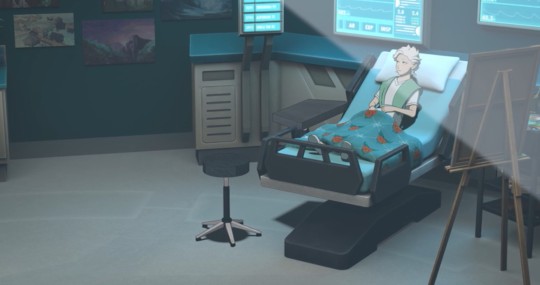
No one else can visit her---and thus we don’t hear the conversation---because Ironwood wants Winter to inherit the power. Okay. So that leaves us with a couple options now:
Older woman can inherit and Ozpin made a very iffy call in trying to foster that responsibility off on a First Year. Which is probably down to more writing concerns than Ozpin’s characterization. Meaning, you want to keep the conflict among the main cast, not bring in a random new character to do the volume’s Important Thing. So you set up Pyrrha as the Fall Maiden, even though in-world that looks like a sketchy decision. To say nothing of the fact that Rooster Teeth isn’t very good at setting down hard rules. What functioned as a limitation during Volume 3 can easily be wiped away in Volume 7. In the same way that we went from Qrow’s semblance being totally passive and range-based to “sometimes I can’t control it.”
Ironwood and Winter are assuming that Winter can inherit, but she’s actually too old now. They’ll be blindsided by this when the power unexpectedly goes to someone else.
Ironwood has convinced Winter that she can inherit but actually has some sort of other plan up his sleeve.
Really, my biggest takeaway is Winter’s speech about how she is choosing this. Regardless of whether fate forced her into a situation with only bad options. Regardless of whether others also want her to make this decision. It’s still her choice. 95% of the fandom needs to listen to that speech and then chuck Pyrrha into Winter’s place. Having only tough choices isn’t the same thing as having no choice. The fact that your choice coincides with what others want doesn’t lessen it. They both chose to take on this power and it’s wrong for others to trivialize that by claiming that the men in their life---Ozpin and Ironwood---manipulated them. It’s implying that they can’t make their own decisions. That making this terribly difficult choice doesn’t come down to their own strength. They know it’s dangerous, regardless of whether they understand every detail of that danger, and actively choose to take on that responsibility anyway. Because they want to do some good in the world. The fandom has worked its butt off to take that away from Pyrrha and I really hope they don’t do the same to Winter.
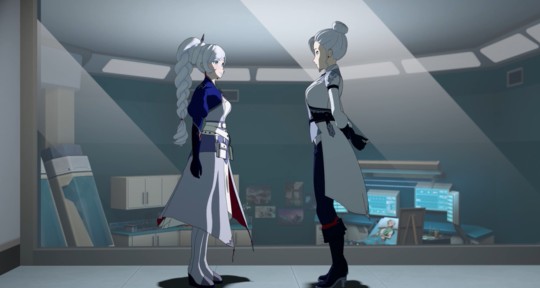
Although... the death flags. Yeesh but Winter looks like a particularly enticing target for the end of this Volume. What with talk of destiny and all... I really hope the series doesn’t go the route of giving every Team RWBY member one of the Maiden powers, what with Winter in a position to think about Weiss if she dies with the power, Raven in a position to think about Yang, and Cinder obsessed with Ruby literally all the time... yeah. As I’ve mentioned before, I’m personally more invested in ‘normal’ people managing the impossible through hard work, belief in themselves and each other, all that jazz. Not already overpowered people (at least in Ruby’s case) getting literal magic to solve their problems with. There’s so much more you can do with that.
Finally, Jacques comes online to spew a bunch of BS about how everything ever is Ironwood’s fault and he’s totally suffering just like everyone in Mantle.

Right.
As Winter says though, the lies are just enough of a “spark” to ignite an already pissed off populace. We close on an angry mob beginning to tear the streets apart. Guess we’ll find out next week how the group tackles that nasty problem.
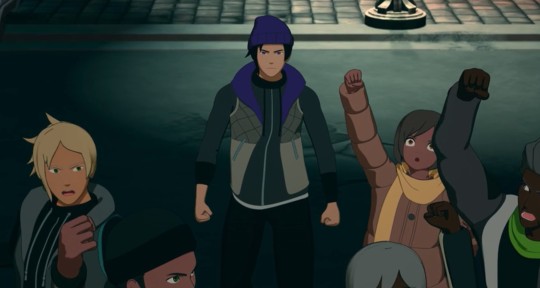
Until then! 💜
Minor Things of Note
What was that sandwich gag? RWBY is really pushing the humor in iffy directions this volume.
I enjoyed Qrow and Clover playing cards though. What a mess with their semblances.
Also, I made us a poster:

86 notes
·
View notes
Text
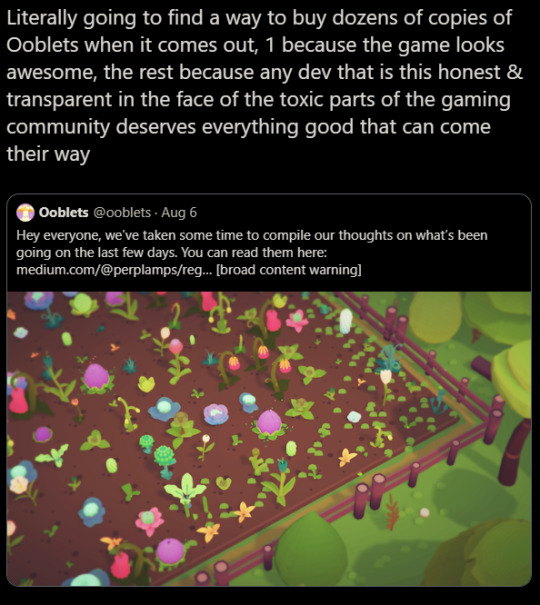
RE: My post earlier about the Ooblets Epic Games Exclusive backlash.
I’m not going to show the Twitter user, if you follow the indie game development scene on Twitter it’s likely you’ll recognize this tweet, either way that’s not who I am. The Ooblet’s account on the other hand is fair-game since it’s basically a product placement.
I feel it needs reiterating how utterly dense this kind of tweet is, and how completely skewed the narrative for this issue has gotten, so let me reiterate in obnoxiously large and emboldened font to try and get the point across:
THE GAMING COMMUNITY IS NOT TOXIC
“Honesty” and “transparency” are all well and good, but unless you’re honestly trying to drive away your own community, perhaps you should try being a little less honest and a little less transparent. No one (or I guess no one but this guy and the few who agree with him) is going to thank you for honestly throwing them under the proverbial bus after they’ve spent months, if not years, supporting your project; your dream.
I’ve heard from others that “this is just how they write” and “it’s meant to be funny”, and to an extent, I can understand that. But let me just include some screenshots from the post in question to reiterate my point, because I feel like my previous post didn’t quite get the point across:

(Context: What the Epic Games Exclusivity Deal means for you, the fan and/or financial backer of Ooblets).
I get that the Fortnite bit is the joke, ha ha, Fortnite used to be wildly popular, I get it, good meme. What isn’t the joke, and what was part of why people got upset was the first bit, specifically the “download the Epic Games Launcher and make an Epic Games account” bit, that bit.
Now, I personally have no qualms about having the Epic Games Launcher on my PC. I have long since looked beyond the ‘scandal’ of tech companies saving and selling my data to distant lands to be used for nefarious moneymaking schemes. Is it bad? Sure, maybe. Would I prevent it had I the chance? Of course. Do I have that chance? Not a chance in the world, so I decide to live with it.
That said, many others have not reached that point of fuck it, and understandably so. I hit that point because of my negative outlook on society as a whole but, praise be, there are in fact still some optimists out there who look at these shitty corporate tactics and say no to them, and good on them for that.
That is what I would say is the bulk of the primary issues people have with the Epic Games Store. The missing features bits aren’t terribly important, as even this post says, if you have a social life on Steam, then use Steam. The EGS does not need to be your do-all replacement.
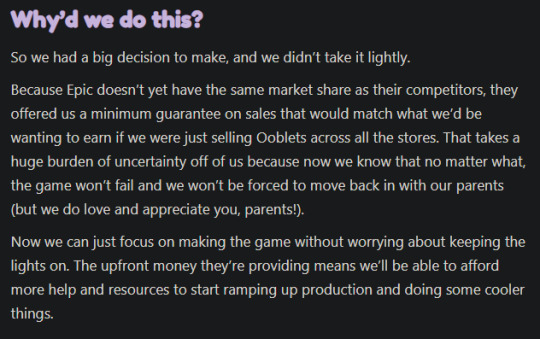
This is where the post should have stopped. Here and now, had this post ended, any and all issues with this decision would have been but a whisper in the wind. As I said in my previous post, yes they undoubtedly would have received plenty of critical, and non-critical backlash for the decision regardless, but ending the post here would’ve 100% put the developers on the right side in this situation and I’d be right up there agreeing with that tweet.

(Context: Are you angry at Epic and/or us for this decision?)
Referring to earlier when I said that playful tone and humour are all fine and dandy, I understand that this is probably meant to sound playful and humourous, but it comes across as largely self-important and ignorant, and the bits that follow do in no way dissuade from that appearance.

While my response to this complaint was similar to their own, in that you should just use Steam for the features that the Epic Games Store lacks, they go on to essentially say that this is just baby EGS and that Steam used to be just like it and look at it now.
While they aren’t technically wrong, from a development point of view, the big thing they need to understand is how web standards have dramatically changed since 2003 when the Steam store launched. Launching a store, of any variety, without a shopping cart is a big no-no.
As far as missing features go, that’s not like missing a friends list or a IM feature, that’s missing a crucial part of a web-based storefront. Imagine going to a store and only be allowed to purchase one thing at a time, that would be ridiculous.

Their response to this was as corporate as any triple-A publisher, or really any corporation at all, from any industry. Just a complete disconnect from society that frankly is unwarranted from what is quite literally a two person operation. Not to mention, their response is quite literally what every parent warns their kids about at a young age. “But mooooooooooooom, everyone is doing it!!!!” Yes sweetie, but if everyone jumps off a bridge, are you going to?
Apparently, yes.
And not to discount the idea of making money, by all means make money, but let me put it this way, had they left this post exactly where I said they should have previously, all of the blame would be at Epic’s feet. Because at the end of the day, having your game be exclusive to one service does not make you money, it makes them money. So this whole “everyone is doing it” schtick doesn’t fly when coming from the developers. Had this been a post by Epic (and frankly with all the shilling I could be convinced it was from them) then this argument might have made just a tiny bit more sense.
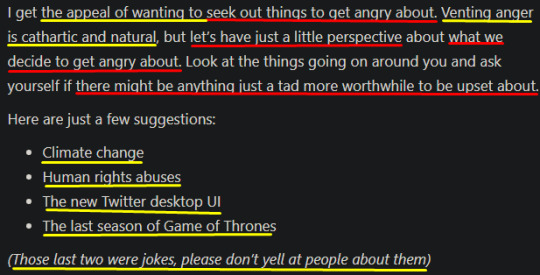
Underlined in yellow are the jokes; the “playful” and “humourous” attitude I’ve heard so much about. Underlined in red however, are what the developers are actually genuinely saying with complete and utter seriousness.
“There are worse things in the world to be upset about.” I kid you not, that’s their argument.
Now, all of that reiterated, to get to the actual point of this post (wish Tumblr let you do multiple “Keep Reading” lines but I digress), the article linked in the tweet here is about the previous “non-critical” backlash I mentioned they’d receive, though multiplied exponentially by their horrendous blog post, and further community responses to said blog post.
I’d like to refer to a completely unrelated post I made quite a while ago that really needs to spread like wildfire if you ask me:
RECEIVING INSULTS, UNCRITICAL FEEDBACK, AND/OR DEATH THREATS DOES NOT INVALIDATE THE CRITICAL FEEDBACK NOR THE ISSUE AT HAND.
I am by no means wiping away death threats or mean words as things to scoff at, by all means take them as seriously as you will, but under no circumstances should 20+ people telling you to kill yourself invalidate the hundreds of fans and financial backers who are upset with your recent financial decision, or your response to criticisms to those decisions.
This happens time and time and time again. Someone of note does something bad, for one reason or another, and instead of responding to the completely warranted and justified criticism and feedback they instead play up the 15+ people who IM’d them to drink bleach and throw it up as “an example of the ever present toxic gaming community”.
More or less, the substance to this article is their “apology”, and I use that term very loosely but I’ll get to that, to the community at large for the recent events. The post summarizes the issue from their (biased) perspective, posts some screenshots of the colourful responses they’ve received, the usual woe-is-me schtick.
I’d like to highlight a few bits from it to further exemplify the continued mindset of these people:
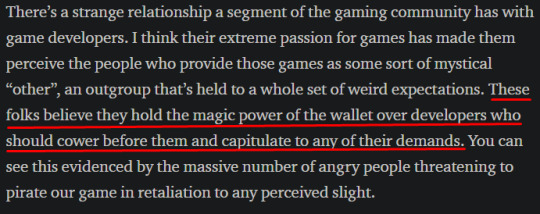
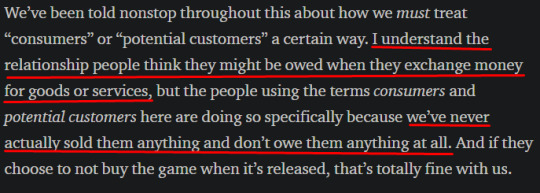
I have given the full context to this next statement with these screenshots so that I can now take parts of these statements out of their context to, at least to my belief, succinctly identify the mindset of these folks:
“I understand the relationship people think they might be owed when they exchanged money for goods or services, but...we’ve never actually sold them anything and don’t owe them anything at all.”
I don’t want to get off-topic any more than necessary, but this, this right here is why fundraisers, Kickstarters, GoFundMes, Patreon subscriptions, or any other form of crowdsourcing platforms need to be handled with extreme care. I hesitate to say regulated legally, but I am by no means opposed to that idea.
I want to express this carefully and plainly: LEGALLY, yes they are absolutely right that they do not owe anyone anything. At least to my knowledge, they didn’t have a formal Kickstarter, their financial backing came primarily from whatever it is they do for a living AND the support of their Patreon backers.
And while I do not feel that it needs addressing, for the sake of consistency I will address it: MORALLY they owe the game to anyone who financially supported them with the express purpose of developing the game.

“We definitely owe all of you who supported us, but also fuck off you entitled cunts because we don’t owe you shit.”
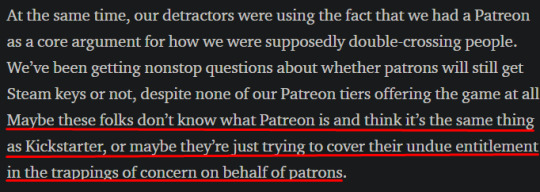
When in the face of well-deserved criticism, deflect deflect deflect. As if a broken record, I’d like to again emphasize that yes, legally they owe no one anything. Morally, they do. Legally, they don’t. Morally, yes. Legally, no.


This, in essence, is a response to the majority of people who are like me, who aren’t screaming vitriolic personable attacks, telling them to drink bleach, long jog off a short pier, the works. Essentially: “If you aren’t with us, then you’re against us.”
Because apparently pointing out your blatant mischaracterisation of the gaming community, your outrageously awful personal relations skills, and most especially your morally bankrupt understanding of the relationship between you and the people financially supporting your passion project means we are, by their logic, on a level equivalent in nature to the 10+ people telling them to drink bleach.

Fixed for typos:

Remember how I said this was an “apology” in the loosest form, well what I was referring to was how in the beginning during their (totally unbiased) summary of the events, they more or less said “Sorry you didn’t respond the way we wanted you to.” Beyond that, yeah, it’s not an apology.
And why would we expect one? Nothing they have spat out in the face of their fans so far has even a hint of self-realization or self-reflection in it. Even their acknowledgement of their (horrendously under exaggerated) bad PR skills comes across as a hollow acknowledgement, if it can even be referred to as an acknowledgement at all, because if you truly truly acknowledged it, then this post wouldn’t exist.
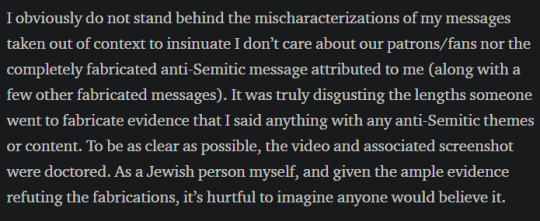
As to this anti-Semitic fabrication making the rounds, I have not seen it so I will take their word for it that they did not make one, especially since I have seen fabricated evidence involving Discord messages rearranged out of order. What I feel needs addressing specifically in this chunk though is his reference to “my messages taken out of context to insinuate I don’t care about our patrons/fans”, because if you’ve seen my previous post then you’ll know no amount of context makes this statement look good:

Sure, it’s a true statement of fact now that they have Epic’s money, but it’s fairly obvious that it reads “We have Epic’s money now, we don’t need you anymore.” I’m sure they didn’t mean that, but that when combined with their other statements regarding how they don’t owe their patrons anything, what they are saying is clear as day.
But hey, credit where credit is due, at least with this we can agree:
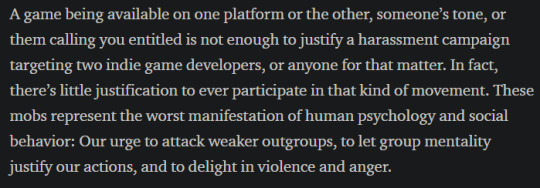
But of course, as these people are now infamously known for not ending their posts where they reasonably should...

Now I know how much money goodwill, faith, and morals make, and again I would fully expect this kind of response from the likes of EA, Ubisoft, Bethesda, or fuck even Amazon or Facebook to show that corporate greed has no industry bounds, but this is a two person team whose passion project is to make this game which is being financially supported by loyal fans and future customers.
And that’s just it, that is the mind-boggling part to me, that this is all just the self-important, mischaracterising, morally bankrupt, and childishly ignorant ramblings of a small little husband and wife duo.
In summary...
As was said in the blog post, I’m sure that looking from the outside in we don’t get to see the full scope of the vitriolic comments they’re receiving, so to that I give them credit, and the most sincerest of apologies. I’ve received a few death threats and vitriolic hate-filed messages in my time on the internet, and while personally I am unphase by them, I can fully understand that it can be damaging to one’s self-esteem and self-confidence, especially when it comes in relation to your passion project. I am sorry.
But unwarranted, hate-filled, vitriolic, suicide-baiting messages do not invalid those of us criticizing you for the things that you did do, the words that you did say, and the actions that you did take. I mentioned this in my previous post, but as it stands, the centerpiece to this issue isn’t even about the Epic Exclusivity Deal anymore, it’s about you. You and your treatment, of not just the community at large (for which, might I add, is your primary customer base), but of your treatment towards your loyal fans and financial supporters along the way.
You, for whatever reason, act as most of us have come to expect a soulless and faceless triple-A publisher would, when in fact you are just a two person team with public faces. You’re taking the shots that the likes of EA, Activision, or Bethesda would and have taken, but you’re forgetting that it is above and beyond easier to find you then it is to find them.
All we, but more importantly your fans want from you is for you to make the best game that we all know you’re capable of. And for those who supported you this far along the way to be given even an ounce of respect, despite you not needing their support anymore.
#long post#seriously don't click keep reading unless you really want to read this#it's stupid long#ooblets#indie games#indie developers#video game development#random rant
121 notes
·
View notes
Text
Punisher 2099 #1 Thoughts

This issue far and away blows every other one in this event thus far out of the water!Remember when I criticized the rebooting of the 2099 line on principle.
Remember how I said it was asinine to redo the 2099 line with a 2019 lens of the future?
Well I’ll have to admit to being somewhat wrong about that.
Its still insulting and dumb to reboot the line. And there is still precious little about 2019’s vision of the future that’d be all that different to 1992’s. Or at least if you were trying to still be similar to the latter’s vision.
Buuuuuuuut…whilst those things are still broadly dumb this issue makes excellent use of them. And does so in a way that almost justifies this direct.
Lonnie Nadler & Zac Thompson (who I’ve never heard of before this issue) have truly EMBRACED the sci-fi nature of this event and the mission statement of it to reboot and update this vision of the future.
In this issue they present not just a new spin on Punisher 2099, but a wholesale new spin on the Punisher, at least from my own limited experience with the character.
The original Punisher 2099 (Jake Gallows) is an important part of this story, but he is not the main character, rather that’s new character Hector Tago.
At first glance you might think that we’re in a similar situation to F4 2099 wherein the title character is in fact not the main character, but thats not the case here.
Hector IS the Punisher of this title.
This is something of a mixed bag, especially if you liked the original Punisher 2099.
On principle you aren’t going to like such a change, let alone rebooting Jake’s characterization. In all honesty at face value the story could’ve worked just as effectively had Jake been the lead character and someone else (Hector or another original character) filled his role in the narrative. That also would’ve cut closer to the original character.
On the other hand though...how many people honestly even liked the original Punisher 2099?
Seriously, I’ve read it and seen multiple reviews of it and it comes up as unimpressive. It was really just ANOTHER Punisher book amidst the sea of them in the 1990s. What made things worse is that Jake Gallows wasn’t all that distinctive from Frank Castle. Whilst Miguel O’Hara zigged where Peter Parker zagged, Jake Gallows functionally simply wore a different outfit with more high tech equipment and had baseball bat.
When you look at a lot of the best 2099 reinventions of classic characters they always take something intrinsic to the character’s power set, costume and name and take it in a different direction. Case in point, Cap 2099 does from a free single white male into a sort of enslaved married Hispanic female (who’s RIPPED). Black Widow 2099 is literally a black woman who eats her lovers post-coital. In fact a fair few of the 2099 reinventions of characters operated by taking characters’ names and powers more literally.
Punisher 2099 wasn’t initially approached that way. But Hector Tago, the NEW Punisher 2099 absolutely was.
A major theme of this story, perhaps THE major theme, is punishment.
Jake Gallows in his mind is punishing the Thorites for his family’s deaths.
Davis Dunn is punished for crimes he didn’t commit.
Everyone punishes each other via a form of social media (we’ll get back to that), Kenji Wallace being the most obvious example.
And Hector punishes Gallows, but more importantly he punishes HIMSELF!
He views being the punisher as a form of atonement for the sins he committed as part of the authorities, and he is seemingly committed now to fighting the system.
This is almost the polar opposite of Frank Castle isn’t it?
Frank was a man who believed in the system, but felt it wasn’t harsh enough. His objections to it were not so much that it hurt citizens but rather that it didn’t go far enough in protecting them by curtailing criminal elements. Thus when those criminal elements took his family away from him, he resolved to punish them and by extension ALL criminals.
The fact that Hector is in most respects on the opposite end of the spectrum from Frank makes the Gallows in truth all to perfect an antagonist. Due to being so similar to the original Punisher, Gallows on a meta level represents the typical depiction of the Punisher and thus through on the page contrast with Hector more clearly emphasises where Hector zigs where Frank/Jake zagged.
The one thing Hector and Frank do share though is their absolute commitment to their respective missions. For both men, becoming the Punisher was a rebirth and they lived for their missions. One of the best scenes of the comic is when Hector metaphorically burns his old life down. He’s not Hector anymore. He is simply the Punisher!
I pray for the original 2099 line to be restored but if there was some way to fold Hector back into it, that’d be just perfect!
The ONLY thing that doesn’t really work with his character is the fact that there was zero justification for him to adorn himself in the skull outfit. It kind of came out of nowhere and he does it simply because it’s a Punisher book and that’s just expected.
There are other great aspects to the book too.
As I said up top, the title embraces the sci-fi nature of the event and the mission statement of re-evaluating the 2099 from a 2019 perspective vs. a 1992 perspective.
Whilst that’s mostly pointless this book makes it work by zeroing in on several elements that were either not around in 1992 or at least not as talked about:
· The prevalence of surveillance technology, including facial recognition technology (speculative science fiction in 1992, actual science reality in 2019). This was achieved through the IRIS drones among other security cameras
· Deep fake technology (see above). This was conveyed through the alterations of the IRIS’s allegedly objective recordings. Its particularly dangerous as its used as propaganda by the authorities.
· Police corruption and brutality, especially towards marginalized groups (definitely a thing in 1992, but the current zeitgeist in the 2010s is distinctly anti-cop). Literally everything the Public Eye do (especially regarding the Thorites), they reminded me of the Street Judges from Judge Dredd. I might be somewhat misreading the metaphor though because the Thorites aren’t exactly innocent, but one shouldn’t judge them as a monolith I suppose.
· Greater exposure of homosexual people, trans people and social activists (again a thing in 1992, but very much not as talked about as it is now). Wallace’s character. The comic book presents him as a man in a same sex relationship and it’s no big deal. He then transformed for lack of a better word into a robot, a robot who literally preaches to the crowds about the ills of society. He’s wiped out by the police. What’s most interesting is that not only is being in a gay relationship no big deal but Wallace’s transformation was motivated BY wanting to reconcile with his lover.
· Social media and how it’s empowered the court of public opinion. Everyone gets rated by everyone else on social media and you can find yourself essentially exiled as a result.
· Arguably dangerous prescription drugs, though I don’t know enough about that to really touch the topic.
· Artificial intelligence, though this is very lightly part of the story, more a background fact rather than something really explored
· The erosion of objectivity in favour of efficiency
For starters, whilst the text boxes doling out exposition about how technology and prison system work were interesting...maybe show instead of tell? This is a visual medium, showing is actually a lot easier than telling us.· The Conan 2099 comic had a warning about mature content even though that amounted to Conan cutting some people up. Maybe that does warrant a mature content warning, but you know if so then maybe this comic with it’s literal tree made from corpses should get one too? Just be consistent is all.
One more sort of positive I’ve going to give out, this was the first issue that made the Alpha story seem relevant.
In the Alpha story you SEE stuff that either sets up directly events for this comic or thematically sets it up by establishing the Public Eye’s conflicts with the Thorites. The only downside is that the tease for Jake Gallows, in particular him being Punisher 2099, was false advertising.
Also, if this story was deliberately written with the intention of subverting your expectations by making Hector the Punisher instead then it failed. Because it was obvious from the moment Hector became the character we were following.
Over all I’d HIGHLY recommend checking this book out. Small problems aside it slapped hard!
17 notes
·
View notes
Text
The Abyss Gazes Also - Watchmen blog
(SPOILER WARNING: The following is an in-depth critical analysis. if you haven’t read this comic yet, you may want to before reading this review)

Rorschach is arguably the most beloved character in the graphic novel.
Now anyone reading these reviews who hasn’t read the graphic novel I imagine must be slightly confused by that statement, considering I haven’t exactly been painting a very glowing picture of him. He’s misogynistic, homophobic, bigoted, violent and sociopathic. Not exactly the traits you’d associate with a ‘beloved’ character. And yet that’s exactly what he is. Out of all the characters in Watchmen, Rorschach is by far the most popular. Of course this isn’t exactly a good thing. A big reason for his popularity is because of people either missing or ignoring the satirical subtext of the character (Ted Cruz reportedly is a big Rorschach fan. Let that sink in for a moment). That’s not to say the character isn’t well written or compelling. I’ve said in the past that Rorschach is my personal favourite character simply because of how interesting I find him.
The Abyss Gazes Also explores the origins of Rorschach and I thought this would be a good opportunity to not only analyse the chapter, but to also question where this romanticised view of Rorschach may have come from.

The Abyss Gazes Also is told from the perspective of Dr. Malcolm Long. A psychiatrist assigned to evaluate and counsel Walter Kovacs, aka Rorschach. I absolutely love this setup and how it plays out. Like with Doctor Manhattan’s origin story in Watchmaker, rather than just giving us a big info dump, we get to explore the backstory through the eyes of a certain character.
Malcolm represents everything Rorschach despises. He’s part of the corrupt establishment, thinks of no one but himself and deludes himself into thinking everything will be fine so as not to upset the apple cart. (also, while not overtly stated, considering Rorschach’s extreme right wing views, I imagine the fact that Malcolm is black probably doesn’t help matters either). From the beginning we know that Malcolm doesn’t really care about helping Rorschach in any meaningful way. He just wants the fame attached with studying the mind of this infamous vigilante. And by the end he does get to fully understand Rorschach better than anyone else, but at a horrifying cost.
As Malcolm learns more about Walter’s transformation into Rorschach, we see his otherwise upbeat personality slowly dissolve as he begins to see the world from Rorschach’s point of view. I love how Alan Moore chooses to represent this. In the beginning, Malcolm’s notes are eloquent, detailed and optimistic, but as the issue goes on, the sentences start to become more broken, much darker and disjointed to the point where it actually begins to resemble Rorschach’s speech pattern. It’s a subtle illustration of Malcolm’s changing psyche. We also see him become more and more aware of the situation between America and Russia, whereas before he was very much focused inward on his career and his wife. As his perception of the world around him changes, the things he used to care about fall away. He neglects his wife and by the end his career is virtually in tatters because in the wake of potential Armageddon, none of these things matter to him anymore. Now on the one hand you could see this as some kind of comeuppance. A selfish man getting what he deserves. But it’s also deeply tragic because the point is no one should have to view the world the way Rorschach does.
Which brings us to the man himself.

The life of Walter Kovacs is... a bit of a bummer, to say the least. His mother was a prostitute who regularly abused him and he had to endure a lot of bullying and torment by sexist pricks labelling him as a ‘whoreson.’ It’s this that has contributed to his view of women (more on that later) as well as his own distorted view of sex. In the extra material, we get to read some of Walter’s psychological profile, which includes a diary entry from a younger Walter describing a nightmare he had where his mother was ‘dancing’ with a man and, upon further inspection, realises the two have been morphed together into a grotesque monster that then chases him. A literal beast with two backs, if you will.
It’s also worth mentioning that the most significant moments in Walter’s life that led to him becoming Rorschach were all sex related and involved women. Obviously there’s his mother. There’s also the job he got at a women’s clothing store, which clearly made him feel extremely uncomfortable, the rape and murder of Kitty Genovese, whose uncollected dress was used to make the Rorschach mask, and of course the murder of Blaire Roche. This I think is what led to Rorschach’s reductive view of women and also serves in some ways as a damning critique of how women are presented in comics. Every woman Walter has ever encountered has either been a helpless victim or a sexualised monster. Even Laurie, the Silk Spectre, contributes to this because of the sexualised image her mother forced onto her. In many comics, the assault or death of a woman often serves as the catalyst of a male hero’s journey, and Rorschach is the same, except it’s presented deliberately as being incredibly distorted. His relationship with women is already fraught thanks to his mother, but his encounters with Kitty Genovese and Blaire Roche serve as a way for him to justify his distorted view of reality. I particularly like the inclusion of the real life case of Kitty Genovese and the myth that over forty witnesses saw her being attacked and did nothing to help. Of course Walter seizes on this and uses it to support his worldview. We’re not even sure if the dress he uses to make the mask was actually intended for Kitty as it could just be a delusion that Walter has concocted to fit his narrative. Whereas other comics might use a woman’s pain as motivation for the male hero, here we see the male ‘hero’ use multiple women’s pain as a means to an end. A way of excusing his behaviour and justifying his actions. It’s a great reversal, exploring the sexism of the refrigerated woman trope.

What I find especially interesting is how despite his childhood, despite his right wing views and despite his reductive view of women, in his early days you could accurately describe Rorschach as a proper superhero. During the period that Walter refers to himself as being ‘soft,’ he teams up with Nite Owl and stops many criminal masterminds such as Big Figure, Jimmy the Gimmick and Underboss. You get the feeling that, had he stuck with Nite Owl, he might have grown to be a somewhat more balanced individual. (which is not to say Dan doesn’t have flaws too, but he’s far better adjusted than Rorschach is, that’s for damn sure). It’s what comes later that sends Rorschach past the point of no return. And no I’m not talking about the murder of Blaire Roche, though that was probably the final straw. I’m talking about Rorschach’s first encounter with the Comedian.
See, I don’t think Rorschach would have become a murderer if he hadn’t met the Comedian first. In his interview with Malcolm, Walter speaks of the Comedian in glowing terms, saying he’s the only one that understood how the world works. If it wasn’t for the Comedian planting the seed of nihilism in Rorschach’s head, he might have reacted slightly differently when he discovered the fate of Blaire Roche. I’m not saying he wouldn’t have reacted violently, but I do honestly think it wouldn’t have been quite so extreme.
I’ve said in a previous review how all the characters of Watchmen are technically nihilists. Rorschach and Comedian are a perfect illustration of two contrasting ways of reacting to nihilism. Namely moral absolutism versus amorality. The Comedian believes that the world has no meaning and that morality is a joke, and so uses that as an excuse to commit heinous acts for his own amusement. Rorschach is also a nihilist. After his encounter with Gerald Grice, he learns that morality and meaning doesn’t exist, but unlike the Comedian, Rorschach takes the opportunity to impose his own morality onto the world. Like ink blots on a blank canvas. The problem is with his own warped sense of reality as well as his motivation. Having discovered that Gerald had killed Blaire Roche, dismembered her and fed her to his dogs, Rorschach no longer has any interest in helping people because, in his mind, people are beyond help. He just wants to hurt and punish those that ruined the world. This isn’t justice. This is revenge. Revenge based on faulty logic. Walter says this was the day he became Rorschach, but it’s also the day he stopped being a superhero as far as I’m concerned. While his motivations and worldview was questionable before, he was at least acting for the common good. Now he’s just an angry man lashing out at the world indiscriminately.
So why do some people have this romanticised view of Rorschach? Well one reason I think is because he’s a man who lives by his own code. Whether we admit to it or not, there is a part of us that wants to see the predators of our society get what they deserve, so even though we recognise that Rorschach is going too far and that his views and beliefs are unsavoury, there’s a little voice in the back of our heads that most of us may not want to acknowledge quietly whispering ‘yes.’ Because if these are truly evil people he’s doing these despicable things to, then it must be okay, right? But then we have to ask ourselves the same question we did about the Comedian back in Absent Friends. Are we saying that the moment someone commits a crime, their life becomes forfeit? That they deserve to die? What does that say about us and our own morality? Which leads to another reason why I believe some people romanticise Rorschach. It’s because it’s easier to romanticise Rorschach rather than to acknowledge what he potentially says about us.
I love Rorschach because, as a character, he forces us to ask some very awkward and uncomfortable questions about our own morality. How far is too far? Where do we draw the line? If the misogyny, psychotic behaviour and extreme violence aren’t deal-breakers, what is? Can we really excuse these poisonous views and beliefs if the person in question is acting, supposedly, for the greater good? This is what makes Rorschach such a fascinating character in my opinion. And I’m sorry to say that if you can’t bring yourself to think about these things, then I’m afraid you just don’t understand Rorschach, or indeed Watchmen, at all.
15 notes
·
View notes
Text
Ready Player One — Level Two (Chapters 17-18)
“I’m not crazy about reality, but it’s still the only place to get a decent meal. —Groucho Marx”
Hey, at least the book isn’t quoting a fictional text that only exists in its own universe this time. That said, you know, when the quotes you give the biggest highlight to all have to do with how much the world sucks, it’s kind of killing my buzz about the whole “being alive” thing. Oh, and I guess it makes it look like you’re trying too hard to be edgy.
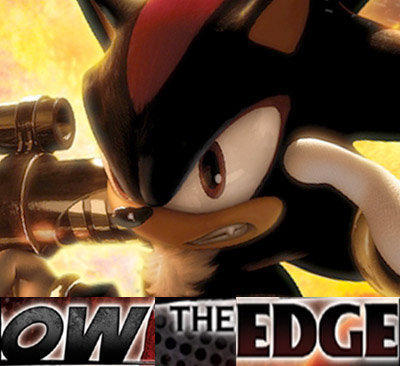
But I guess these are all shallow, surface problems. Let’s dig deeper as we enter Level Two and find out how much worse the infodumping gets. Because yes, it’s back in full force.
See, the book actually does justify splitting itself in multiple parts. At least for now. Specifically, it does so by way of a time skip. Well…sort of. More of a compressed time frame of a few months, which is mostly summarized to us through Wade and Artemis’s chatlogs.
Because, yeah, they’ve been chatting. Or, I should say, Wade has been harassing Artemis until she caved in and agreed to talk to him.
Parzival: Yes! Hey! I can’t believe you finally responded to one of my chat requests. Art3mis: Only to ask you to cut it out.
I will skip over the ensuing banter, because yes, of course they start bantering in spite of Artemis making it very clear she does not want to talk to him. Banter which pretty quickly takes a deep, hard dive into…questionable territory.
Parzival: So you’re telling me, definitively, that you are a female? IRL? […] After analyzing the available data, I’ve concluded that you must be a female. […] Because I don’t want to find out that I’ve got a crush on some 300 lb. dude named Chuck who lives in his mother’s basement in suburban Detroit.
I think there should be a ban on men using the word “female” as a noun. Preferably until the end of time. The correlation between that and misogyny is too high. Although, I don’t know, maybe it’s a useful alarm bell.
Artemis challenges that, and expresses suspicion that he wouldn’t care about her personality, and not “the package it comes in”. Parzival claims that he totally does, and…put a pin in that, we’ll get back to it in a short moment. But first, Artemis flat-out rejects the idea of engaging in romance with Wade, mostly on the grounds that he doesn’t really know her, only the side of her she lets him see. Which is fair, although I’m not sure if you can really act like that’s only true online (or even more true online, in their world at least).
But if you think rejection is going to deter Wade “I have stalked this girl for years on her blog” Watts, well…I mean, refusing to take no for an answer is how this chapter started, so you know that’s not happening.
So he insists. And insists. And insists some more. Oh, and did you know the Sixers tried to blow up Wade’s trailer?
Art3mis: You shouldn’t reveal stuff like that! I could be a Sixer spy trying to profile you. Parzival: The Sixers already profiled me, remember? They blew up my house. Well, it was a trailer. But they blew it up. Art3mis: I know. I’m still freaked out about that. I can only imagine how you feel. Parzival: Revenge is a dish best served cold.
You sure sound torn up about it, Wade.
Yeah, the book is basically going to flat-out ignore the ramifications of Wade’s house blowing up and him being forced to move to a new location and forge himself a new identity. No consequences—not practical ones nor emotional ones. It’s especially weird, because…moving to Columbus on the money he earns through his endorsement deals was already his plan to begin with. If the only purpose was to get Wade from point A to point B, the setup was already there. But since there’s no other consequences to IOI blowing up his home…what was the point of IOI blowing up his home? From a pure storytelling perspective, I mean? I’m just puzzled at this point.
Somehow, Artemis is still talking to Wade, so they start playing a game of one question each. We do learn that Artemis is 19 years old, studying poetry and creative writing in college. Not very important information, but it’s something. Assuming she’s telling the truth, but I’m sure she is.
And now, we get back to that “Wade doesn’t care about the package Artemis comes in, only her personality”. With bonus transphobia!
Parzival: […] Now, spill it. Are you a woman? And by that I mean are you a human female who has never had a sex-change operation? Art3mis: That’s pretty specific. Parzival: Answer the question, Claire. Art3mis: I am, and always have been, a human female.
I…hopefully don’t need to explain the problem with this, right? It’s basically transphobia 101: he states that trans women aren’t women, or at least not “really” women; he overfocuses on their body and specifically genitals (using some outdated and offensive terminology even by 2011 standards, I’m fairly certain); and they both equate genitals with gender, since Wade acts like you can only even be a woman post-transition, and Artemis’s response implies that pre-transition trans women aren’t women.
But it’s even worse in the light of that thing I told you to put a pin on. Because if Wade doesn’t care about her body, only her personality…shouldn’t it not matter that she’s trans? Hell, shouldn’t it not matter that she’s trans and pre-transition? And if he does care about her genitals, shouldn’t it still not matter that she’s trans if she’s post-transition?
I’ll stop this discussion here before I myself get too close to talking about trans people’s genitals. All I’ll say is this: if you think the transphobia is an isolated issue, you’re not thinking hard enough. With this statement, Wade doesn’t just prove he doesn’t consider trans women as real women, he also establishes that he does care about Artemis’s body.
It’s easy to make a grand statement about how you love women no matter how they look. It’s much harder to maintain that stance in how you actually talk to and about women. It’s a similar problem that plagued the Nerd Porn Auteur poem: it’s one thing to say you want all women and all body types to be viewed as attractive, but when the rest of your poem clearly establishes that you just want to enforce your own standard, it belies your thesis statement.
For the record, I knew this quote was coming, but it’s still awful to read, especially in the context of this guy harassing her into talking to him in the first place, and repeatedly making advances at her in spite of her constant rejection.
You’d think there would be some lull in the misogyny in this book, but apparently that’s a tall order.
Finally, Artemis says she has to go, and says they shouldn’t talk again until one of them finds the egg. Wade’s reaction?
Parzival: Can I at least keep e-mailing you? […] You can’t stop me from e-mailing you. Art3mis: Actually, I can. I can block you on my contact list. Parzival: You wouldn’t do that, though. Would you? Art3mis: Not if you don’t force me to. Parzival: Harsh. Unnecessarily harsh.
You’re literally saying you’ll harass her more, so…no, clearly it’s not “unnecessarily harsh”, it’s exactly the right response.
So of course, after a scene break…
I started e-mailing her.
Yup. He starts emailing her weekly, and Artemis, for some reason that’s totally unrelated to being written by a man who’s likely never experienced that kind of harassment and also has no empathy for the people who do, replies to him. Well, not just replies to him; she starts going back and forth and goes all the way to meeting him in private chatrooms.
We played vintage board games, watched movies, and listened to music. We talked for hours. Long, rambling conversations about everything under the sun. Spending time with her was intoxicating. We seemed to have everything in common. We shared the same interests. We were driven by the same goal. She got all of my jokes. She made me laugh. She made me think. She changed the way I saw the world. I’d never had such a powerful, immediate connection with another human being before. Not even with Aech.
For the record, while this is still pretty shallow character and relationship development, I feel like this might be the closest we’ll get to fleshing things out in this book. This is as good as it gets. Or…as good as it’s gotten so far, I should probably say. I have my expectations for what comes next, but it’s wrong to assume, kids.
Speaking of rushed relationship development, we’re now in full skimming mode, to the point where Wade and Artemis now share their research regarding the Hunt, even though that’s basically antithetical to both their established characters. Is this what love is for straight people, becoming the opposite of who you were before? No wonder they have so many hang-ups about marriage.
Wade also tells us about how he missed his graduation and got his diploma by email, and…you gotta wonder at which point the Sixers will catch on to him still being alive, you know. I mean, the endorsement ads with Parzival, I can get that these could go on with Wade dead. But school? Did nobody even bother to identify the corpses in the stack?
If you think I’m asking this for something utterly trivial, don’t worry, we’ll get back to that too. But enough about the plot; I guess we’re giving up on it now.
When I finished school, I’d intended to devote all of my time to the Hunt. But all I really wanted to do was spend time with Art3mis.
Yeah. The girl’s what distracted you from the Hunt. Not the attempt against your life, though. That barely registered as a blip on the radar.
We also get a brief recap of Wade leveling up to 99, the maximum level in the OASIS. This includes a description of a quest where he and Artemis play as characters from the Goonies. And you might be wondering: wait, weren’t the flicksyncs supposed to be this revolutionary new feature? Well, apparently all the quests in the OASIS (or most of them, anyway) are also based on just…replaying the story of existing properties. In fact, it’s starting to look like the OASIS has two types of planets: the ones built by players, like IOI’s planets, and the ones that are built to match existing properties. Which begs the question: what was the OASIS’s launch content, when it had neither of these? Just the starting planet and Ludus?
Anyway, the book suddenly remembers about the Easter Egg, in the most random of fashions imaginable: by having Wade go on a rant about how there are no longer toys in cereal boxes.
It was a tragedy, in my opinion. Another sign that civilization was going straight down the tubes.
Yeah. Toys in cereals, the true canary in the civilization coal mine. Good job there.
But anyway. From this, Wade remembers a hacker from the ’70s (and…yeah, the 70s are fair game all of a sudden) who took on the moniker Captain Crunch, who used the toy whistle from the eponymous cereal to hack into analog phones. From this, wade decides that “the captain” and “the whistle” in the Quatrain are references to…the cereal. Not the hacker. Sure sounds to me like you’re stretching the guess a little far there, book.
I mean, even if he’d stuck to just making the connection, this is still just the character getting divine inspiration to solve the puzzle. Nothing of actual import causes this reveal. This passage is literally introduced as “Then, one morning” and him thinking of the connection. Because, you know, it’s not like giving your readers a riddle they’re able to solve along with the characters would keep them engaged or anything.
And with that random epiphany out of the way, we’re back to a whole lot of nothing, since Eureka moments are apparently the only way Wade solves any of the riddles. And by “nothing” I mean more obsessing over Artemis, and how he wants to meet her face to face, even though earlier this chapter he wouldn’t even send her a picture of himself.
I was certain she had strong feelings for me, but she also kept me at a distance. No matter how much I revealed about myself to her—and I wound up revealing just about everything, including my real name—she always adamantly refused to reveal any details about her own life. All I knew was that she was nineteen and that she lived somewhere in the Pacific Northwest. That was all she would tell me.
You know, the impression I’m getting from this is that you misread her completely and she’s not interested. I mean, she keeps rejecting your attempts at communication unless you pressure her so much that it’s easier to just talk to you, and she won’t give any personal detail. That does not strike me as someone who’s into you.
Wade also grows distant from Aech in this time, because fuck friendship now that he has a woman to stalk, I guess. I mean, of course, they barely qualified as friends in the first place, so…no big loss there.
Somehow, without my realizing it, my obsession with finding Halliday’s Easter egg was gradually being supplanted by my obsession with Art3mis.
I was informed that I used the “Big red flags” gif too soon last time, and…yeah, I’m seeing why now. This is just the worst case scenario. You’re romanticizing some really unhealthy behavior there, book.
And it keeps going. They go on dates now! In the OASIS of course. And they do so in spite of Artemis protesting that it’s not safe for Wade to make public appearances, since, again, IOI wants him dead. Plus, they’re afraid of tabloids.
But there was one exception. One night, she took me to see the Rocky Horror Picture Show in a huge stadium-sized movie theater on the planet Transsexual, where they held the most highly attended and longest-running weekly screening of the movie in the OASIS.
Oh dear. Let’s…let’s move on. I’m not touching the fact that the book dropped Rocky Horror in the same chapter as it featured an incredibly transphobic statement. Someone more qualified will have to take that one.
That night was easily the most fun I’d ever had in my life up to that point. I told Art3mis so afterward, and that was when she leaned over and kissed me for the first time. I couldn’t feel it, of course. But it still set my heart racing.
Yes, yes. I know. Obviously the book means for her to be into him and all my earlier ranting about her not being interested was wrong. Ha, ha. Except, you know, not. Of course she’ll fall for him—she’s designed to, as the love interest. The issue is with what the book chose to portray as her being interested. That is to say, her showing every sign of disinterest. Which is rape culture. No, I’m not mincing words—it is. Equating a woman’s constant rejection to her being into you is exactly what rape culture is about. If you look at what rapists say when on trial, the defense is almost always a variation on “I thought she wanted it”. So this book, providing a fantasy where she really is into it, deep down…yeah, it’s rape culture. And if that phrase sets off your triggers and you have a problem with that, big whoop, just re-read the paragraph and skip them this time. The message still stands.
Thankfully, we don’t have to deal with them being together for too long.
And then one night, like a complete idiot, I told her how I felt.
Well, mostly because the book probably couldn’t handle writing a romance where the characters actually are together for very long, what with its inability to write emotions. But sure, let’s go with “telling someone how you feel about them is an idiot move”. There’s no way that could feed into toxic masculinity or some bad relationship advice.
So, after this line, we get a chapter break, which I guess is supposed to act as a cliffhanger of sorts, since after that the book backtracks a little to set the stage. I’ll go over this quickly: remember Ogden Morrow, Halliday’s best friend? He hosts his birthday party in the OASIS every year, and it’s a big exclusive event, and of course the High Five are invited. Aech is busy, Daito and Shoto never enter a PvP area unless necessary, which leaves Artemis and Wade. Artemis wants to go, and Wade decides to as well to impress her or something.
She said she couldn’t pass up an invitation from Og himself, despite the obvious risks. So, naturally, I told her I would meet her there at the club. It was the only way I could avoid looking like a total wuss.
Wow. You big strong manly man. I’m sure she’ll swoon right into your arms and—oh wait, you ended the previous chapter by telling us you were gonna confess your feelings and it’d end badly. You kinda blew your load early there to be trying to milk some tension out of this there, buddy.
And I hear you. Back up, you say, a PvP zone? Yes! Ogden Morrow has his party in “the Distracted Globe, shortened to ”the Globe". No Shakespeare involved here, since he’s not from the 80s; instead, it’s a zero-gravity dance club. Except you can swim and dance in zero gravity, because this book for nerds didn’t think to research its physics properly. I mean, what are the odds that a bunch of nerds would criticize the science of your science fiction book, right?
And it’s also a PvP zone. I guess Ogden’s party runs on the honor system and hopes that no one is going to attack anyone here.
The book spends a massive paragraph describing Wade’s car to us. It’s a modified DeLorean crammed with references to other sci-fi movies, because apparently, the book doesn’t understand class. And yes, I’m forced to point out that Cline has a very real version of this car:
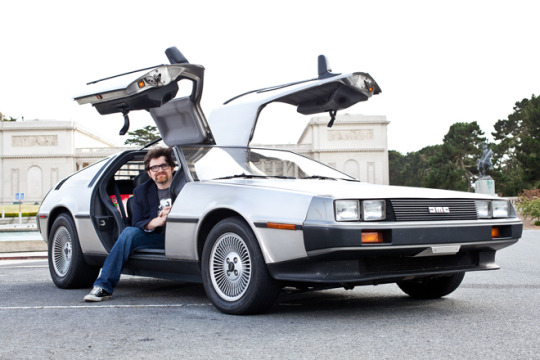
Which…okay, not the worst thing ever, I guess, but don’t you think it’s a little on the nose?
After this (and another paragraph telling us how everyone will want to steal his car, but it doesn’t matter, because he has a miniaturizing spell and keeps the car on his person, because MMORPGs letting you put your mounts in your inventory is not a concept that the author has heard of), it’s on to the party. In which Artemis and Wade name-drop a bunch of songs, and…dance. Kind of.
Her avatar lost its human form and dissolved into a pulsing amorphous blob that changed its size and color in synch with the music. I selected the mirror partner option on my dance software and began to do the same. My avatar’s limbs and torso began to flow and spin like taffy, encircling Art3mis, while strange color patterns flowed and shifted across my skin.
Is this someone’s kink? I’m extremely confused that this is the imagery you chose to go for, especially when the book tells us everyone else on the (spherical, zero-gravity) dance floor starts following suit and dancing as colored blobs.
After this, it’s time for the cliché slow dance, and Wade tells Artemis he’s in love with her.
“You aren’t in love with me, Z,” she said. “You don’t even know me.” […] “You only see what I want you to see.” She placed a hand on her chest. “This isn’t my real body, Wade. Or my real face.” “I don’t care! I’m in love with your mind—with the person you are. I couldn’t care less about the packaging.” “You’re just saying that,” she said. There was an unsteadiness in her voice. “Trust me. If I ever let you see me in person, you would be repulsed.”
Such foreshadowing. As for his statement…see my earlier rant about his transphobic statement.
Once again, Artemis keeps telling him no, Wade keeps insisting, and she decides they have to stop hanging out.
“Are you breaking up with me?” “No, Z,” she said firmly. “I am not breaking up with you. That would be impossible, because we are not together.” There was suddenly venom in her voice. “We’ve never even met!”
She’s right, of course. But before the book can linger on that detail for too long, let’s have the Sixers randomly attack the club! Which they do by sending troops inside, even though we established the game has nukes already and they could just make the whole place explode without wasting any avatars. Whatever. Fight scene time.
Then I realized that most of the Sixers’ incoming fire seemed to be directed at me and Art3mis. They were here to kill the two of us. […] I knew my own recklessness had brought them down on us. I cursed myself for being so foolish.
…Are you implying Artemis wouldn’t have been a valuable enough target? No, of course it’s all about you. Dick.
This scene, by the way, goes nowhere. It’s devoid of tension. Mostly because, before anything really major can happen, Ogden reveals that he apparently has god mode turned on, and fries all the Sixers in the club. Thus also making the attack entirely pointless. Well, unless Ogden does turn out to be the main villain and this is a showcase of the threat he is. Which I’m still somewhat convinced he might be. Or should be.
But anyway, when the dust settles, Artemis is gone, and Wade is sad, I guess. Boo hoo. Whatever shall he do, the object of his obsession is gone.
#ready player one#ernest cline#book reviews#ya books#young adult#books#young adult books#ya#reviews#book#book review#review#st: ready player one
13 notes
·
View notes
Text
Legion Rewatch Notes,
Chapter 4:
Frizzytop
I theorized in episode 2 that David could see through the 4th wall, or at least into a different universe. At the start of this episode Oliver outright breaks the 4th wall. Perhaps powerful reality benders just have that capability. If David knows, and Oliver knows, then Farouk definitely knows.
“A great philosopher once wrote, ‘In times of peace, the war like man attacks himself.’ This is the route of all our problems.”
“We are the route of all our problems. Our confusion, our anger, our fear of things we don’t understand.”
If we carry those 2 quotes throughout the rest of the show, then no doubt the tragedies that happen later on are caused by a collective misunderstanding of each other. And a collective lashing out at that misunderstanding of each other.
“Violence, in other words, is ignorance.”
The most central theme of the show is empathy vs fear. I s’pose whenever there’s a conflict in the show we’re supposed to be asking whether the characters should answer with empathy or fear. Certain characters lives have revolved heavily around fear. And that informs their decision making quite a bit. This will all come up again at multiple points throughout the show.
Syd... probably can’t break the 4th wall. So maybe it’s most logical to interpret this as her inner monologue. Very Jessica Jones esque.
The same voice lines from when Syd was searching for David in episode 1 are played. I guess there go to whenever Davids lost (whether in the world or in his mind) is to transmit Syds voice calling his name in hopes he’ll hear it and come back.
Kerry can pick locks.
The concept of “bad mutants” is well established amongst the veteran summerland crew. Ptonomy’s caution about David is probably because he feels he has a selfish vibe, and that’s a well known red flag of “bad mutants.”
It should also be noted he’s partly afraid of him because he has so much trouble understanding him. His powers, which when used affectively are essentially the ability to understand where someone’s coming from, keep getting overrided by Davids.
It’s now to the point where Ptonomy is doubting his own ability to tell what’s real and what’s not real. He was pretty confident he’d always know somehow in episode 2. Now, not so much.
Ptonomy very early on is open to the idea that David both has powers and psychological issues. “He’s unstable. You try hearing voices for 10-15 years, self medicate with hard drugs and then get dumped in a looney bin.”
Ptonomy also determines that because of his instability combined with the fact he has powers, David is a bomb waiting to go off.
I suppose if we’re trying to figure out their logic with the whole “the combination of being mentally ill and having powers makes him dangerous”, and considering that their right now going over an incident where David robbed his therapist for drug money and then bashed the doctors head in when he came back, the direct concern is that David makes bad decisions and/or selfish decisions (at least), and if he were to make a bad decision regarding his powers a lot of innocent people could get very badly hurt. Or killed. Along with the worry that the voices in his head don’t exactly give him the most angelic of advice at times, and because of his powers he’s very capable of fulfilling their wills, so to speak.
Based on Olivers speech at the beginning of the episode though, it might be safe to say the overall message is instead of acting on fear they should act on empathy and help David overcome his problems instead of vilifying him for his mental illness.
Syd suggest Davids hiding his real memories behind a fake ones and Ptonomy says she going through a lot of effort just to convince herself Davids a good guy. I never really got what he meant, but I guess what he meant is that Syd’s trying to find a justifiable reason for why David would attack Dr Poole like he did when the obvious answer is just “He’s got violent tendencies.” I always just thought she was genuinely hypothesizing, ya know, trying to solve the case. Maybe she was and Ptonomy’s just mean.
“I was looking for the man I loved. Or did I just love the idea of him? The face he showed me?” Doubt springs up early. Why can none of the characters reconcile that a person can have both good and evil in them at the same time? That’s... all people, in fact.
When Kissinger ask if Amy knew David had powers Amy says, “I think so.” Amy potentially acted on fear as well, in regards to her and Davids childhood that is.
Kerry mostly only thinks of herself in relation to Cary.
Cary misses Kerry when she’s gone. Even besides the roles they fill for each other, they generally enjoy each others company. They’re quite literally as close as 2 people can be. Each one living for the sake of the other.
Davids once again surrounded by a crowd of people all yelling in his face. After they disappear though he recovers pretty fast. I guess he’s used to it.
Clockworks Podcast pointed out that the music Davids wincing at is sax heavy Jazz, which is (abstractly) the sound The Devil With Yellow Eyes makes whenever he appears. If my theory about David seeing through the 4th wall is correct, then maybe he’s actually hearing that sound whenever TDWYE is around. Alternatively, Farouk blast that in his head everytime to mess with him.
“Sorry... I forgot about your um... I had a similar- proclivity? Malady? I forget the word- what’s the word? I’ve been here a long time.”
If the previous paragraphs are right, Oliver’s probably implying he was also affected by a mental parasite at some point. It might’ve even been what stranded him in the astral plane.
From Davids perspective he skipped over the entire second half of Chapter 3.
Oliver is essentially explaining the plot of the show to David and the audience before it’s even been unfurled.
“You have an unquiet mind, so you war with yourself, like a dog trying to chew off its own tail.”
David’s still in a very pessimistic guilt ridden place at this point in the story. That’s probably the internal war Oliver’s talking about.
... why can’t Oliver leave the astral plane again? If he did have his own mental parasite, it seems long gone by now. If he just can’t find his way back, then how does he do it in Chapter 7?
Syd calls non-mutants “normals.”
“We were the ghost in a haunted house.” ~Syd, Chapter 4
“You think ghost like living in a haunted house?” ~Syd, Chapter 12
Why does Syd keep hallucinating The Angriest Boy? Or is that just visual metaphor?
Ptonomy’s a very, “Get the job done and look classy while doing it” sorta guy.
“To fight and conquer in all our battles is not supreme excellence; supreme excellence consists in breaking the enemy's resistance without fighting.” ~Sun Tzu, Ptonomy
Is the above quote perhaps relevant to the shows message during other conflicts throughout the series? Could it be subtly implying all the characters should always look for non-violent ways to defeat their enemies? I.e. not just a classy line from Ptonomy, but a statement of themes within the show.
The food David, Philly, and Dr Poole are having in Philly’s memories is cherry pie.
In Philly’s memory David says, “I don’t keep a lot of stuff.” And Philly comments that there’s no evidence David had a past. At least among the things David owns at that point. I know Farouk edited a lot of Davids memories, but why did David himself get rid of so much physical stuff? Syd said the reason he broke into Dr Pooles that day was to destroy their taped conversations. What’s compelling him to erase himself from existence? Is it as simple as “Farouk”? It seems like on a deeper level David doesn’t want anyone to know too much about him. Everyone’s only allowed to know what he tells them. His way of feeling in control I guess.
Philly did the classic “I can fix him” when she started dating David.
Philly implies David going off his medication and keeping bad company is what caused the downfall of their relationship. And subsequently his life, probably.
Despite everything, Philly still feels sympathetic towards David.
“Whoever altered Davids memory-“ Ptonomy very early on humors the idea that Davids being acted on by a 3rd party.
The longer Kerry is away from Cary, the more antsy she is for a fight. She’s not supposed to have to sit through all this “boring stuff.”
Ptonomy left after he got the info on Pooles location from Philly. He probably wanted to get the rest of the information from the source. Ironically, they probably woulda gotten closer to the real answer if he’d just looked a bit longer.
Sys proudly says “Yes” when “Dr Poole” ask if she’s in love with David.
It never really comes up again, but Kerry and Cary are physically linked. Maybe even psychologically. When one of them gets hurt, or even exerts their body a lot, the other can feel it, even if their own body doesn’t take on the actual damage. This is still true even if they’re miles apart.
Syds definitely portrayed as the hero at the end of this scene.
“All those years of practice-“ A part of David always knew he had powers. I wonder, did he practice a little in secret? Or is he saying he was at Summerland for years? That doesn’t really add up. But then... what does he mean by years?
Lenny encourages David to get angry so that his powers will strengthen enough for them to overpower the astral plane. Sort of... cheating his way out. David will later achieve more feats of strength through honing his emotions. Like many heroes, his level of power is intrinsically linked to his emotional state.
Very directly here, Davids violence is caused by ignorance. He doesn’t know Syd switched bodies with Walter and is trying to escape.
3 notes
·
View notes
Text
Let’s Check Our Thought Process
MAKING A COMMITMENT TO CRITICAL THINKING
“When we are not given reasons, you must understand the natural human response is to form our own conclusions. And I feel that is what we have done.”
-Comment recorded at a school board meeting
Recently, as part of a group exercise, I was asked to reflect on my “greatest professional learning” during the pandemic. We were given a few weeks to think and then were asked to share our responses when we met.
A cynical answer popped into my mind: People don’t practice critical thinking very well and are either unconscious of that or are willing to flaunt it without shame.
The quotation at the top of the page is verbatim; It was spoken during a well-attended public meeting. It was not taken out of context; it was offered plainly in an effort to explain peoples’ actions by framing the thought process that guided them.
More outrageous than the statement itself (which argues openly in favor of prejudice and justifies acting without understanding relevant facts) was the lack of response from others in the on-line meeting. No one pushed back. No one questioned the premise, a premise that would be flatly rejected by any competent scientist, logician, academic publication or court of law. It hardly needs dissecting; its potential consequences are so obvious. And yet, 40 people remained silent. In a governance meeting of an institution dedicated to learning, dedicated to teaching children how to think rationally and independently, someone was able to say something so irrational and receive no response other than some nodding agreement from the audience.
To be fair, emotions were running high and arguing a logical counterpoint (even an argument that nearly makes itself simply by repeating what was said slowly) would probably come across as aggressive and partisan. But later on, when the emotional tenor of the meeting had subsided, shouldn’t the entire group, including the person who said it, have taken a moment to reflect and consider the foolishness of such thinking? Are we so concerned with the fragility of others’ egos that we don’t have the collective will to set and reinforce norms for rational thinking like we do for other elements of public discourse?
Unfortunately, I believe we do not. The year of the pandemic has provided many examples of our cultural tendency to avoid being critical of others’ reasoning in favor of avoiding hurt feelings or of “just moving on”. In board meetings, task force gatherings and during the every-day interactions in our schools, I have observed the abject failure of critical thinking coupled with the social failure to respond. (In some cases people have even applauded fundamentally flawed thinking.)
Maybe, like a man with a hammer to whom the world appears to be a nail, I am seeing the failure of critical thinking everywhere I look. However, it may not be that the pandemic has diminished peoples’ capacity to think critically; perhaps this widely-shared social deficit was just as bad before COVID-19 and the crisis has simply made it more plain.
COMMON POPULAR LAPSES IN CRITICAL THINKING
Your Truth, Best Practices, Trauma, Words are Violence and Speaking from the Heart.
“Thank you for telling your truth.” I heard someone say recently when another person shared a perspective and a set of supporting facts that could have brought about reasonable disagreement. I had to check my own thinking because I happened to agree with the person’s perspective. But that doesn’t mean she was sharing the truth. If my “truth” were different from hers and mutually exclusive, would that mean that there are two contradictory truths? If that is the case, doesn’t that mean that truth and perspective have become synonymous? Doesn’t that give Kellyanne Conway license to develop “alternative facts” when the actual facts don’t support her perspective or opinion? Doesn’t that mean Donald Trump is still the President or that at least has reasonable claim to the office?
I have running joke with a colleague: During a discussion or debate, whomever declares “best practice” first, wins. We’ve even begun team meetings by entering the room and shouting “best practice!” before anyone else can talk. It actually gets funny when you start listening for it at work. By beginning your proposition thus: “Best practice says….” one automatically ties a potentially controversial statement (fairly easy to debate) to one’s own professional judgement and reputation, which others are usually more hesitant to question. An idea is somewhat independent of the person but a judgement is not, and people in polite company generally prefer to debate ideas rather than question others’ judgement.
For example, if I were to say that giving 3rd graders timed multiplication fact tests in large groups is “best practice” anyone who argues with me not only objects to the tests but also insults me by questioning my judgement.
On the other hand if I were to make the proposition without judgement: “I’m thinking of giving my 3rd grade class a timed whole group multiplication test on Friday.” It is more socially acceptable for my colleagues to give me candid feedback. I’m not hitching my wagon to the practice but expressing an idea. The obvious advantage to that is it gives one better access to the wisdom of one’s colleagues, helps one clarify his or her thinking and act in a more effective and humane manner.
I’ve heard the word “trauma” abused to the point that feel traumatized when I hear it. I’m exactly half kidding. Hearing the word trauma does not cause me trauma but the term trauma has been weakened substantially by overuse. Last week I was in a meeting and the host said, “I understand all of our kids have suffered trauma over the last year.” Being polite, and not wanting to disrupt her flow as the meeting began, I resisted the temptation to speak up and say, “No, they have not. Some kids are happier and more resilient now than they were before the pandemic and we should not expect them to suffer long term psychological harm. Others have had a hard time but have not suffered trauma. Maybe some (I would guess a small number) have gone through trauma but certainly not all of them.
Trauma indicates the need for a serious response either medically or psychologically. To claim that all children have suffered trauma when common sense and probability would argue otherwise is doubly problematic. First, diagnosing all children with trauma might lead us to implement an uneven distribution of resources, reducing timely access for legitimately traumatized children. Secondly, declaring universal trauma weakens the term itself. For example, if my child is presumed to have had trauma (absent a serious medical or psychological event that can be reasonably predicted to cause long-term problems) he is put on the same footing as another child who actually did suffer a serious medical or psychological event. Should he not then be treated with the same urgency? After a while because everyone is traumatized, no one is traumatized.
“There are different kinds of violence, words are violence!” An audience member asserted during the public comment period in a recent school board meeting. Others nodded. Words can be violent metaphorically but in and of themselves words are never violent. Similar to trauma, the entire concept of violence (and its attendant appropriate responses) are weakened by misuse. Words can certainly be powerful. They can encourage, perhaps even cause violence, but alone, they do not constitute violence.
It is important to make that distinction. For example, if someone were to say to me, I am going to say some really horrible words to you or if you prefer, I am going to do something physically violent to you, which would you choose? I’m pretty sure, I’d opt for the words even if I didn’t have the details about the kind of violence being planned. If a guy in the next car yells a nasty name at me, I would certainly prefer that to him punching me in the mouth. We can ignore words. We can tune them out. We can consider them and respond. Lumping words together with real violence lessens the outrage we should feel about violence and increases the outrage we should be able to control about words.
Okay, I am going to speak from the heart: I have learned that when I speak from the heart it is acceptable to say anything no matter how irrational, absurd or self-serving without fear that others will question it. Speaking from the heart gets my audience to pause and understand that my forthcoming statement is deeply attached to my emotional composition and that challenging it will go beyond questioning my logic and into the realm of hurting my feelings. I know that questioning my logic is socially appropriate and professionally desirable but hurting my feelings goes too far! If I speak from the heart well enough, I might even choke up a little letting everyone know a line has been drawn that should not be crossed. Real speaking from the heart also signals my virtue because it shows I have the courage to be vulnerable in public. What brute would argue with someone who has the courage to be vulnerable, to speak from the heart?
I actually spoke from the heart accidentally a few weeks ago. I was in a meeting and was accused of something I thought was particularly unfair. When I responded, I choked up a little, something I try to avoid in my professional life, but it happens from time to time. Anyway, the people who had said the thing I didn’t appreciate changed their tone and were suddenly very polite to me and even thanked me for being vulnerable. They assured me that they understood my perspective and knew my intentions were positive. So I know speaking from the heart works but I’ll still try to avoid it. (I know when it comes up naturally it works better than when you just declare it in advacne.)
Kidding aside, wrapping one’s opinion or perspective in emotional language or gestures is problematic. It squelches honest inquiry and may discourage others from sharing important information that will help everyone concerned. Emotions are important and worth our attention but they should not be used as a tool to override reason. Emotions arise in all of us and deserve consideration but they also deserve time to settle so that we can think straight. We need to allow others that courtesy as well. When someone speaks “from the heart”, including oneself, it’s worth listening, maybe even acting. But the words that come from that kind of speaking need time to cool off and be tempered by dispassionate critical thinking.
We Can Work on This... and we should!
A cultural tendency to avoid critical thinking was not, it turns out, my greatest learning from the pandemic. A deeper recognition of our ability to consider any situation, let emotions arise and eventually choose our response was. This isn’t a new lesson but a deepening of an old one. It gives me the optimism to get back to the work of advocating for critical thinking for ourselves and for our children. It isn’t easy. It can make people angry. I think its what got Socrates killed. But it is, I believe, the core of our work: Critical thinking is the foundation for all the subjects kids learn in school. And it’s time to re-commit to making it a central feature of our work and discourse.
To that end I propose a community-wide, long term study of the topic. I’d like to start by recommending the adoption of a definition of critical thinking, the one offered by The Foundation for Critical Thinking: The art of analyzing and evaluating thought processes with a view to improving them. Critical Thinking is self-directed, self-disciplined, self-monitored and self-corrective thinking. (Linda Elder, 2020)
From here, I hope we can make it fun and interesting. We need to get comfortable with being wrong about things and re-thinking our positions. It’s not about winning individually but improving as a community of learners. That’s an important part of our mission.
0 notes
Text
eddie is horribly abusive and y’all need to be aware of him
i really did not want to have to resort to this. i fully intended to not call eddie out and just let this die off. since it hasn’t, multiple friends have convinced me to come forward with the abuse, stalking, harassment, manipulation, gaslighting, misgendering, etc i have been subjected to at the hands of eddie over the past week+. i haven’t used tumblr in... ages, so i’ve completely forgotten how to use coding in tumblr posts. sorry in advance for that. this is going to be both a call out and a “hey, this is what really went down” type of thing.
before i hop into covering the hot garbage that has been happening, here’s is where to find eddie. i fully encourage everyone to block him and warn others. he has been getting away with abusing people for years.
his twitter: https://twitter.com/mrgluskin
his horror blog: https://outlastwikia.tumblr.com/
if anyone knows the url for his main blog, please let me know.
update: been told his main blog is gluskin. i have not confirmed it for myself because i simply want nothing to do with eddie.
this is going to be long, sorry. tw for... pretty much everything. reblogs are encouraged and appreciated. let’s expose this abuser before he can abuse anyone else.
alright. for background’s sake, eddie followed me on twitter because we had a mutual friend, catherine. right off the bat, he bombed me with positive attention, liking all of my tweets, complimenting me, etc. a friend has since pointed out that abusers often do this before abusing their victims. i just figured he was a friendly guy and didn’t think anything of it. catherine and i had a falling out because she kept frequently using the r slur, despite not being autistic, and it was really making me, an autistic person, feel extremely uncomfortable (this is a whole different can of worms, though. catherine has also been outed as an abuser and a suicide baiter). disgruntled by the situation, i posted this to vent my frustration.
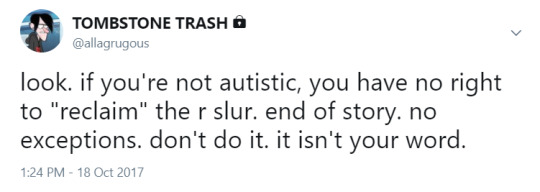
this is my personal opinion on the issue, as an autistic person with autistic friends and family, all who agree with my stance. i’m not here to debate this. i want this to focus on eddie and not get derailed.
eddie absolutely flipped his shit at me. he claimed that since he has adhd (which he went on to say is EXACTLY LIKE AUTISM... not even gonna bother to explain how wrong that is. i have both. i should know) he is entitled to use that slur, my feelings be damned. he said that me saying he should not use the r slur erases the ableism people with adhd face. again, this is... not how it works. i wish i had grabbed screencaps because it seems that his tweets have been deleted. all i have is my side of the conversation, where you can see that i was perfectly calm and polite.
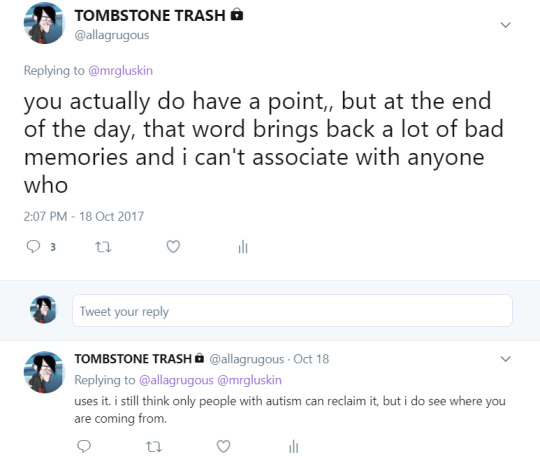
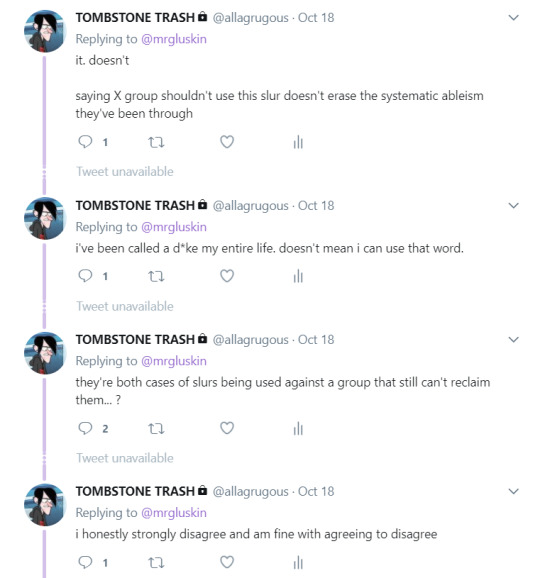
i ended things by explaining that i could agree to disagree for the sake of our friendship & that as long as he didn’t use the slur around me i would be fine. he stopped replying to the thread after that.
a while later, i received this message from eddie.

i’m going to point out real quick that the last time i posted to twitter about my makeup was months ago. eddie could only know this if he dug through MONTHS worth of tweets. this was where his stalking began. he went through hundreds upon hundreds of tweets looking for any tiny thing he could use to attack me over. he was actively looking for conflict & things to be mad about. he needed something to demonize me over, because “they asked me to not say r*tard” is obviously going to make him look bad if he cites that as his reason why he has beef with me. we discussed jeffree star briefly & then he blocked me. i wrongly assumed that was going to be the end of it.
i noticed that, during all of this eddie/catherine drama, someone had stolen my url. i thought it was petty/funny, and posted this to twitter. this is the only thing i said about the url. this is literally it. i did not and have not accused anyone of stealing it. i honestly don’t care because i very rarely am on tumblr nowadays.

i’m not sure of exactly what happened, but i’m assuming either catherine told eddie i had said it was him, or eddie somehow convinced himself of it. eddie unblocked me instantly and sent this.

he reblocked me after this. at that point, i consider it harassment.
as i’m combing through his twitter for all of this shit he did to me, i just now saw that he posted screenshots of our conversations in an attempt to turn people against me, while omitting that this whole thing began because he wanted to use SLURS. he posted a handful of tweets gossiping about me.. he has been attempting to paint me as a racist transphobe and he has been telling everyone i accused him of stealing my url, even though i told him i hadn’t accused anyone.

a mutual friend of ours (who has since ditched him) then contacted me saying eddie was posting screenshots of my social media while shit talking me.
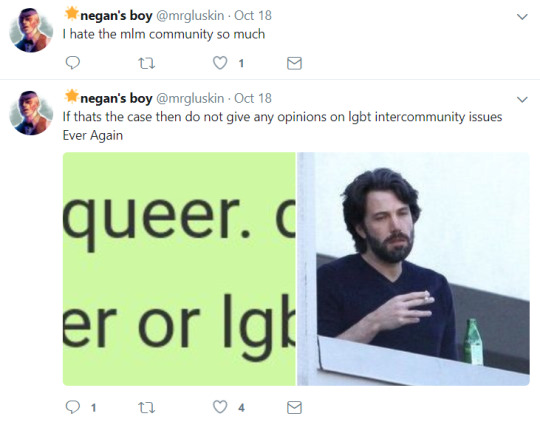

the green thing is a screenshot of my listography. i don’t like or associate with q*eer because it’s a slur. i’ve been distancing myself from the lgbt community as of late due to the influx of rape threats, misgendering, harassment, racism, and overall nastiness i’ve been dealing with from lgbt people. i shouldn’t have to justify this. i have my reasons. this is, again, eddie grasping for anything he can use against me.

because liking problematic things makes someone a bad person, amiright? it’s not like i’m an adult who can recognize when something is problematic & still have the capacity to enjoy aspects of it. to put into perspective... eddie is vocally kin with a serial killer from a game that demonizes mentally ill people. he has no room to talk.
this whole time, eddie has been telling people that he cut me off as a friend over me owning jeffree star makeup and was incessantly trashing my name publicly while spreading lies about me. we have mutual followers, so i posted this, trying to keep his name out of things in an attempt to not escalate the drama.
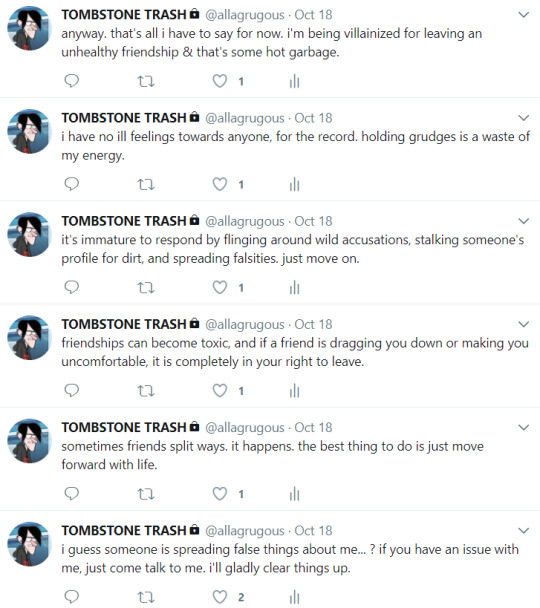
eddie continues to vague and obsess. meanwhile, i’m trying to move on with my life.
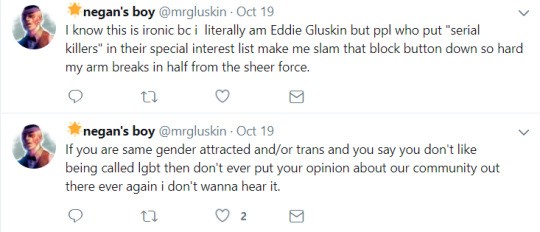
not wanting to be associated with a community that treats me poorly doesn’t mean i suddenly don’t face the same struggles as them or can’t have an opinion on the issues i face, just so you know.
at this point, i sent him a message politely asking him to stop talking about me all over his twitter and to move on with his life. he deleted the response but the preview is still on his twitter.
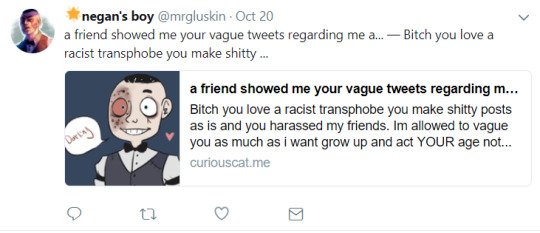
here he is, again, lying about me. i have not contacted a single one of his friends once. i have harassed no one. i haven’t even spoken with catherine since this all began.
anyway.
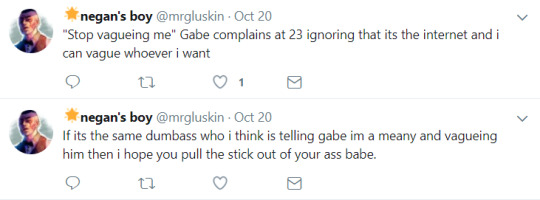
1) i’m 22 but that’s irrelevant
2) anyone else think him calling my friend ‘babe’ is kind of creepy? just saying
eddie began implying if not outright saying that i’m abusive. he posted this while talking about me. he was “confronting” me at the time so... who else could it possibly be about?

i tweeted these in response, because i take abuse allegations extremely seriously. as an abuse survivor, i do not appreciate even having it be IMPLIED that i am abusive.
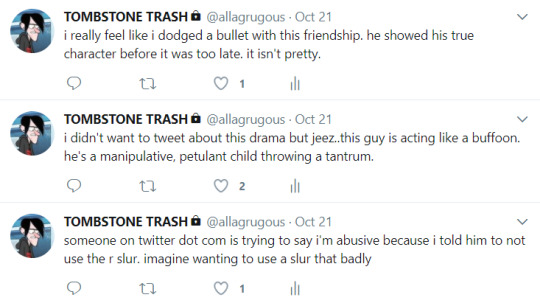
after posting these, i hopped in the shower. eddie proceeds to have a meltdown. he had me blocked but i had not blocked him. at this point, i had blocked our mutuals. the only way he could have seen these tweets was by refreshing my twitter over and over again, waiting for me to say something about him/the situation. eddie unblocked me & quoted my tweets with this.
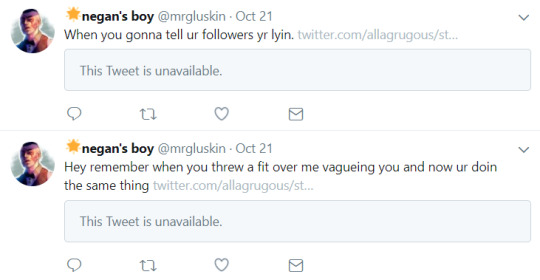
i haven’t lied about anything, as my screencaps illustrate. he just wants to be absolved of any responsibility. i also did not “throw a fit” - i very politely requested that he stop gossiping about me publicly. he also messaged me around the time he quoted my tweets.
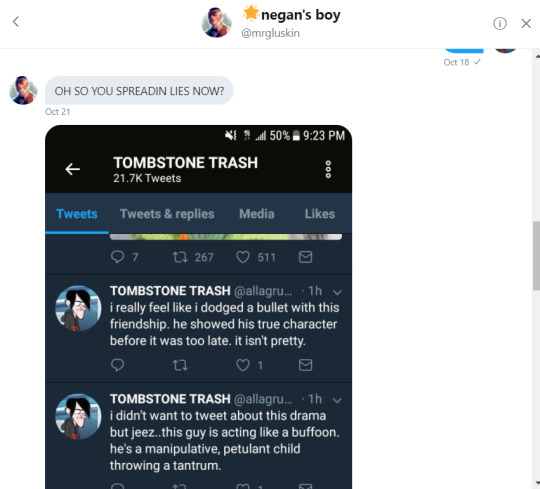


again, have not lied about anything. he attempted to gaslight me by saying he was actually calling jeffree star abusive, which is absolutely not what he did. check the screencaps.
i was tired of being nice to the person who had so far harassed and stalked me, lied about me, and attempted to gaslight me.
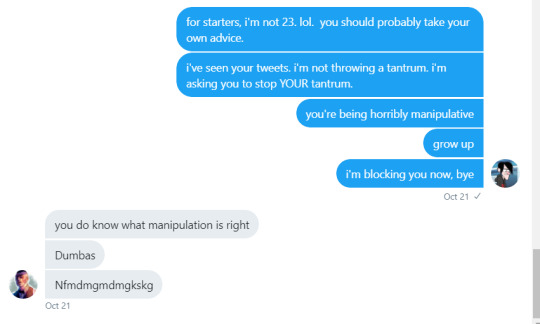
*drops this here*


well i mean, at least he admits he’s been harassing me?
this tweet below was confirmed about me. in it, he calls me a trans man. i have explicitly stated many times that i am not a trans man. i am nonbinary. i have told my twitter following countless times that calling me a man is misgendering. it is in my bio.

@ranunculae aka fawn reached out to me late at night on the 21st. we had a 5+ hour long conversation in which they explained to me that eddie had abused them and has spent the past 2 years harassing and stalking them like he was doing to me. eddie and catherine had teamed up and suicide baited fawn until fawn had to go inpatient. eddie and catherine have been attempting to socially isolate fawn for 2 years now by spreading lies and doctored screencaps in a sketchy “call out”. you can read fawn’s statements here.
https://ranunculae.tumblr.com/post/166659734265/i-never-abused-eddie/amp
https://ranunculae.tumblr.com/post/166779554950/ranunculae-ranunculae-keythecoward
the 2nd link includes a conversation in which a minor talks about eddie grooming him and attempting to be sexual with him.
i’m going to post some things that fawn sent to me over chat just because they’re semi-relevant.
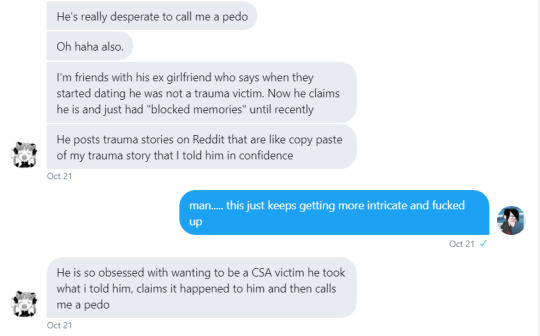

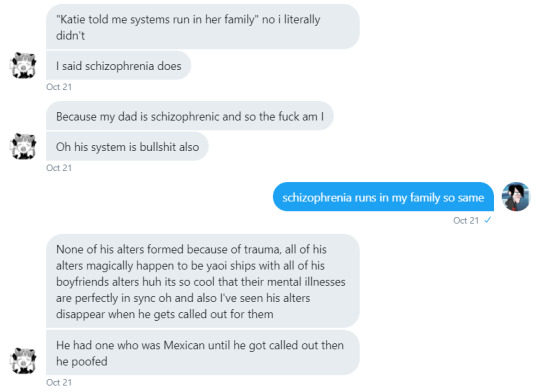
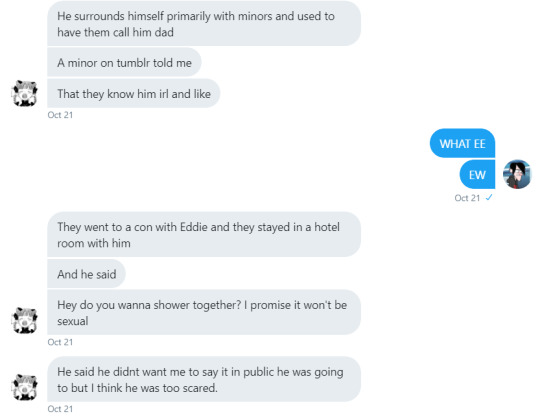

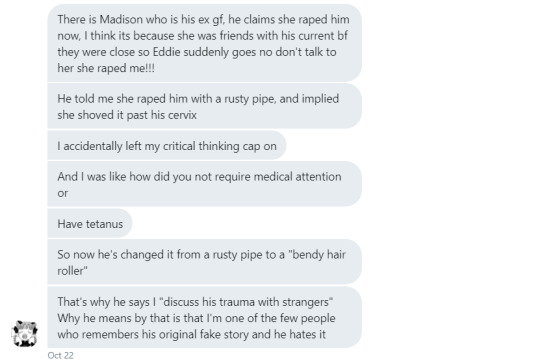
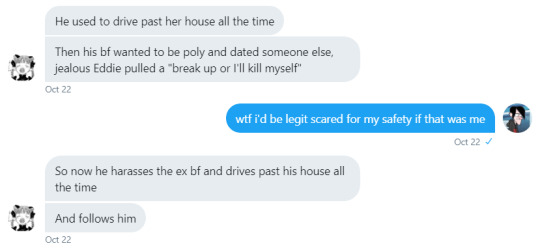

my irl best friend, cat, was close friends with catherine. fawn and i felt that cat needed to know that catherine was involved in suicide baiting and abusing fawn with eddie. so, we approached cat about it and fawn explained their entire side of things to cat.
eddie, through his relentless stalking of me, noticed we were all in contact.
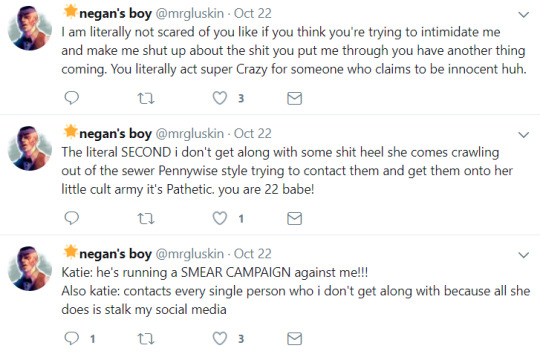
i want to clarify that fawn/katie has not been on his twitter once throughout all of this. fawn’s boyfriend periodically checks eddie’s twitter to see if he’s still stalking and obsessing over fawn. fawn’s boyfriend saw eddie harassing me, and he let fawn know that eddie had picked a new target to abuse. then fawn contacted me. it literally is a smear campaign. and fawn said the smear campaign was against ME, not them, even though eddie has been posting libel about fawn for years.

1) actual minors have come to me and fawn to tell us about eddie preying on them and grooming them
2) this was a response to cat taking mine and fawn’s sides
3) eddie called cat a ‘cuntbag’, which is misogynistic
4) these ‘victims’ have not come forward because they don’t EXIST. meanwhile, i am nearly the 30th victim of eddie’s that has ACTUALLY COME FORWARD.

eddie attempting to guilt trip and manipulate cat, a csa/incest survivor, for siding with fawn.
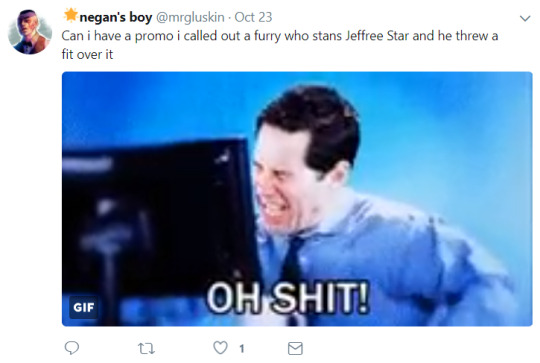
again, more lying about me. as you can clearly see, i never threw a fit. i have been calm during this entire ordeal. also... this is, once again, him trying to divert attention away from what really started this; his NEED to use the r slur around someone who is uncomfortable with it.

cyberfuneral = cat’s twitter handle
cat sent me screenshots. eddie does not have her blocked. this is, again, lies and manipulation. if it looks like we’re sneaking around a block, then we’re obviously the bad guys, right?
when cat confronted catherine about eddie calling her misogynistic insults, eddie lied to catherine and claimed he never called cat a cunt. he didn’t even bother to delete the tweets to hide his lies.
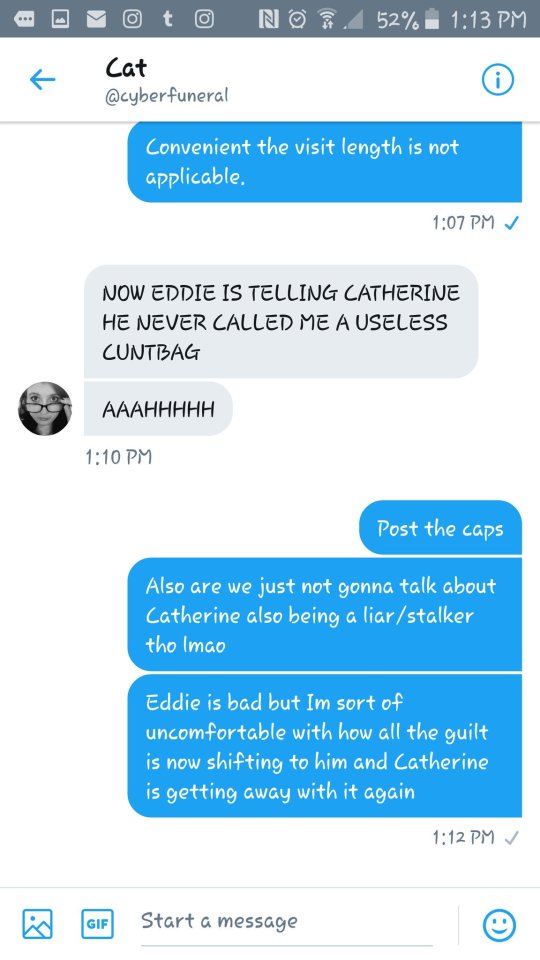

scroll up to see him calling me a man, which i am not, thus it was misgendering. also, childish insults.

this is referring to something i added at the bottom of my listography. i’d like to point out that he posted this within minutes of me updating my listography. further stalking right there.

this is what my listography currently says. it is a temporary placeholder in lieu of an actual call out. it will be replaced or updated with the link to this post after it is published. you wanted the screencaps posted, eddie, so you’re getting your wish.
i can only imagine what filth eddie is saying on his locked personal twitter. i think i’d rather not know, though.
it has been more than an entire week of stalking, harassment, gaslighting, manipulation, lying, smear campaigns, misgendering, misogyny, etc etc from eddie. he is awful. he is abusive and a manipulator. do not befriend him. the second you upset him, he will turn on you and treat you like he has countless others. i am just one victim out of many. stay away. block him. spread this to warn people.
@eddieabuser2
#outlastwikia#ranunculae#avas demon#call out post#abuser call out#gluskin#gayfreddy#edgiegluskin#ptsdgluskin
151 notes
·
View notes
Text
14 Learning Techniques to try - which works best for you?
We live in a strange time. All the world’s information is available at the click of a button. It makes the myriad reams contained in the Library of Alexandria seem pitiful in comparison.
Nowadays, the struggle is not in finding information - it’s in finding high quality information. There’s so much noise out there, how does one find the signal?
As an aside, this is exactly what my startup, Future Builders is working on. #ShamelessPlug
In this post, I’ll briefly discuss a number of learning methodologies and techniques, to help you understand the methods of learning the resonate best. Let me know in the comments if I've missed any, and/or which techniques work best for you :)
Highlighting / Note Taking
A personal favourite of mine, and a very popular methodology… Highlighting sections as you read them, and especially taking notes as you read, turn the learning process from one of passive consumption to active participation. A word of wisdom though - if you’re as prolific with highlighting and taking notes directly on the page as I am, you’ll never be able to sell those books when you’re done with them!
The Feynman Technique
Another personal favourite, this technique can be summarised by the statement - ‘could you describe what you’ve learnt to a 5 year old?’
According to the technique, you should really try to find a 5 year old and explain the topic to them. The technique assumes you’ll note down any confusion and then go back to the topic anew, ensuring that you yourself are in fact able to allay that confusion in a future interaction with said 5 year old, repeating this process until you and your interlocutor understand the topic fully.
If you don’t have easy access to a preschooler, writing your own explanations and summaries of a topic can serve the same goal (more on this later!).
Reflecting and Questioning
This technique encourages you to take time after having learnt a topic to reflect on what you’ve learnt, to verbalise any questions you might have that remain unanswered, and to reflect on how the knowledge you’ve learned can be incorporated into your daily life. It ensures that the learning is solidified to some extent, but it’s easy for people to *think* they’ve done this technique in their head rather than on paper. In reality, doing this technique all in your head can often give illusory benefits if not performed with diligence.
Summarising and Systematising
While there is of course significant crossover with many of these methodologies, this technique seems to be one of the most popular amongst theorists. Once you’ve finished learning a topic, before moving on, are you able to summarise what you’ve learnt? Are you able to turn the topic into something like a mind map? Can you summarise the key arguments, and even the key weaknesses with those arguments, based on what you’ve learnt? It’s with this technique in mind that many people write blogs, create youtube videos and make podcasts about topics they’ve learnt - it’s done as much for the creator themselves to solidify their learning as it is for the audience to enjoy.
Tracking and Gamifying Your Learning
If you’re the sort of person that responds well to achievements, points, badges and #winning or gaining a #streak, this might be one for you to try.
It works particularly well when trying to develop new habits, traits and routines. It doesn’t really matter whether you use pen & paper, Google Docs or some fancy app really - it only matters that you’re diligent in tracking your progress. It involves setting daily/weekly/monthly goals for your learning and using this gamification technique to create extrinsic motivation to keep you on track, and to support your own intrinsic motivation for learning.
Discussion & Peer Review
Not dissimilar to the Feynman technique, this methodology suggests you discuss your learning with peers - ideally ones who are knowledgeable enough about the topic to ask insightful questions, to challenge what you say, and to help close any knowledge gaps that might be surfaced. Nowadays there’s a community for everything, and Reddit has a sub for every topic under the sun - expect to be challenged and peer-reviewed heavily in these online communities though… It’s often useful to practise this technique with supportive friends first.
Hire a Coach
Coaching is, in my humble opinion, one of the most undervalued learning techniques in the modern world. (Almost!) everyone thinks they can get along without needing to rely on a coach, but this is (usually!) an illusion. Good coaches can put rocket fuel on your learning trajectory by giving rapid, high quality feedback, helping you to avoid mistakes and pitfalls, and holding you to account on your progress.
Develop an Intrinsically Motivated, Deliberate Practise
Intrinsic motivation is hard, and takes time to work through. It requires you to find your internal motivation for learning - finding a reason for learning that’s *not* as a route or path to achieving something else, but one that justifies the effort for its own sake. Once you’ve succeeded in fully understanding your intrinsic motivation, you can turn your learning into a long-term, deliberate practise where the ‘goal’ is not to ‘get somewhere’, but to *become* the sort of person that learns consistently and deliberately. It’s a methodology that let’s go of the idea that there will ever be a time when you’re ‘finished’ with your learning. You’ll know if you’ve fully understood your intrinsic motivations, because this ‘impossibility of ever completing the journey’ would offer more motivation, not less.
Testing & Evaluating Yourself
Popular with Uni students the world over, this technique suggests learners create for themselves a series of test questions, essay challenges and questionnaires to test the retention of a specific topic. It requires some discipline to create these tests, and even more in reviewing the responses fairly and accurately, but this can be an incredibly effective technique when done well.
Active Recall
Another technique that’s popular with students, active recall is the process of moving knowledge from short term memory to long term memory. The best system for this is known as the spaced repetition algorithm, which is built in to products like Memrise and Anki.
In this technique, you note all of the important information that you’ve learned (it can be done during or after completion, it’s up to you), and create a system to help you recall that information - it might be by way of physical flash cards, with the question on one side and the answer on another, or it might be done via an app like Memrise.
The learner’s role would be to revisit these question prompts over time, ensuring that the knowledge is being retained in long term memory, revisiting and revising anything that’s shown to have fallen out of memory. Revisiting the cards periodically is an essential part of the technique - and this is why using an app is so useful, since it uses the spaced repetition algorithm to ensure that you’re repeating your efforts at the right intervals.
In terms of retention, active recall puts cramming - the ultimate technique favoured by uni students the world over - to shame.
Experiential Learning
Learning-by-doing has become very popular over recent decades. Coders, for example, are big proponents of this technique. It simply encourages the learner to get stuck in and use their new knowledge as quickly as possible - even if it’s not fully understood. It encourages ‘minimum viable education’, with a goal to practise and do as early as possible. It embraces failure as a way to solidify learning, and it assumes that the topic of learning is something that can be used in a practical environment.
Repeated Exposure
Especially useful for people who don’t retain knowledge easily, and also for those that want to go much deeper into a topic, often learning the same thing from different resources, and therefore slightly different perspectives, can help embed the learning much more deeply than single exposure could.
Just In Time Learning
Popular with corporations, just in time learning is a technique that says you should only ever learn enough to succeed in addressing whatever problem you’re currently facing, and nothing more. Has your boss asked you to add in more data visualisations for the next monthly report? You don’t need to quit your job and do an immersive Data Bootcamp - a short youtube video on how to use Tableau might be enough to do the trick.
This technique is also useful in roles that require breadth in a wide range of topics over depth in a single specialisation - like when trying to get a startup off the ground :)
Interleaving
Interleaving is all about learning multiple topics simultaneously. It’s especially useful for complex, broad topics that require integrated knowledge before mastery can be attained. Becoming a Doctor is one of these, where mastery of a wide-range of interrelated topics is essential. It’s probably the slowest of all the techniques, but it gives learners the ability to make connections across topics that can be incredibly valuable, creative and stimulating. That being said, progression can at times feel hard, slow and frustrating, especially in the early days!
In Summation
There are many ways to learn, but one thing’s for sure… Learning passively - in our mind at least - doesn’t really count as learning. It’s entertainment. Active learning - likes those above - is essential for real progress and mastery. As you can see from this list, there are lots of techniques that you can try and see which fits you best.
Let us know what you think in the comments - Is there anything we missed? Which are your favourite techniques for learning? And which don’t work so well for you? We look forward to continuing the conversation below :)
submitted by /u/FutureBuildersHQ [link] [comments] from Adult Education & Adult Learning Theory https://ift.tt/2MdQPtO via IFTTT
0 notes